



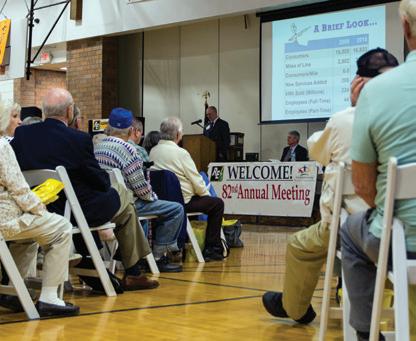

T


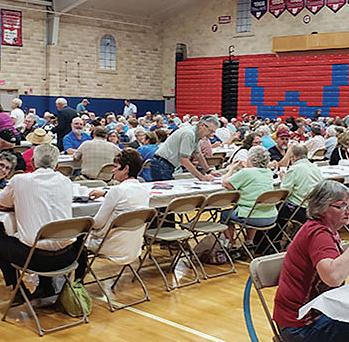
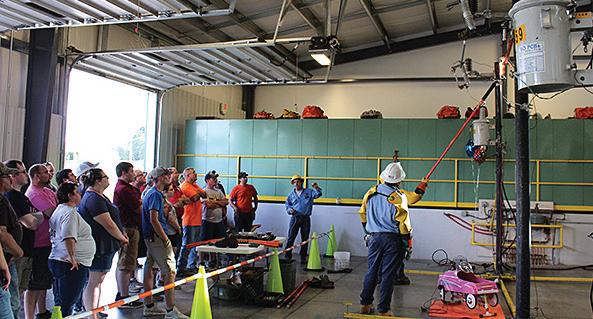








T





4 TRIUMPH OVER DARKNESS
90 years ago, three local farmers laid the groundwork as Ohio got the jump on rural electrification in the U.S.
22 THIS IS THE END
A Dover museum honors people’s lives by commemorating their deaths.
24 LOOK FAST!
Our photo essay documents the fleeting art galleries that often roll by, unnoticed, every time we’re stuck at a railroad crossing.
Cover image on most editions: You don’t have to cut into that perfect pumpkin to create your Halloween jack-o’-lantern — as one co-op member demonstrates in our story on page 10 (photograph by liveslow/Getty Images).
This page: Some of the more than 2,500 funeral-related artifacts and mementos at the Famous Endings Museum, located inside a Dover funeral home (photograph by Jamie Rhein).

In an increasingly digital world, cybersecurity has become second nature to most of us. We lock our phones, use strong passwords, and enable two-factor authentication to protect our personal data. We’re alert for phishing attempts and digital scams that seek to exploit our trust or steal sensitive information. They’re practices that reflect a broader principle: securing what matters.
On a wider scale, that principle is just as important when it comes to power grid security. In the same way each of us guards our own digital lives, power grid operators must defend against a wide array of threats, both physical and cyber. The North American Electric Reliability Corporation has developed a set of standards that serve as the backbone of that effort. They ensure control over who has access to systems, mandate incident response planning, and require continuous monitoring of critical assets. Basically, they are the industrial equivalent of antivirus software, firewalls, and password protocols — but scaled to protect entire regions from blackouts or sabotage.
Yet, power grid security isn’t solely about strong cyber defenses; lots of simpler practices are just as vital. Vegetation management, for instance, ensures that overgrown trees don’t interfere with transmission lines (a leading cause of outages). Physical security measures like fencing, surveillance cameras, and access badges help prevent unauthorized entry to substations and control centers. Continuous monitoring of equipment and environmental conditions allows operators to detect problems before they turn into failures.
The similarities to personal cybersecurity are clear. Just as we update the software of our personal computers at home, grid operators must routinely assess and upgrade their control systems. Just as we remain vigilant against phishing attempts, they must guard against social engineering and insider threats. And just as we back up our data, so do they — while also ensuring redundancy and resilience in the grid’s design.
Ultimately, power grid security is a layered defense, a blend of technology, regulation, and common sense. It’s not just about preventing catastrophic failures, it’s about maintaining trust in the systems that power our lives. As citizens, understanding these parallels helps us appreciate how important it is to protect the grid. After all, the principles that keep our personal data safe are the same ones at work behind the scenes, keeping the lights on.
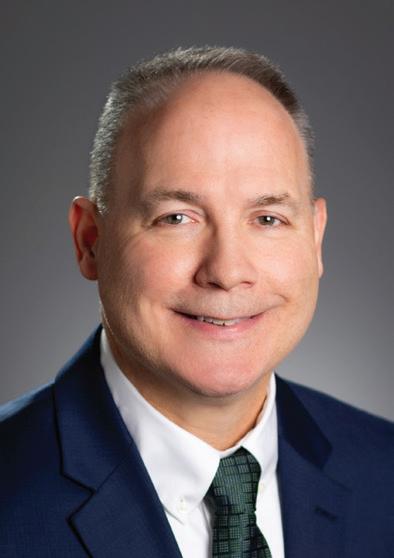
Cybersecurity has become second nature to most of us. Locking our phones and remaining alert for scams reflect a broader principle: protecting what matters.
6677 Busch Blvd. Columbus, OH 43229 614-846-5757 www.ohiocoopliving.com
Craig Grooms President & CEO
Caryn Whitney Director of Communications
Jeff McCallister Senior Managing Editor
Amy Howat Assistant Managing Editor
Neal Kindig Graphic Designer
Contributors: Jodi Borger, Colleen Romick Clark, Getty Images, W.H. “Chip” Gross, Catherine Murray, James Proffitt, Jamie Rhein, and Margie Wuebker.
OHIO COOPERATIVE LIVING (USPS 134-760; ISSN 2572-049X) is published monthly by Ohio Rural Electric Cooperatives, Inc. It is the official communication link between the electric cooperatives in Ohio and West Virginia and their members. Subscription cost for members ranges from $6.48 to $7.92 per year, paid from equity accruing to the member.
POSTMASTER: Send address changes to editorial and advertising offices at: 6677 Busch Boulevard, Columbus, OH 43229-1101. Periodicals postage paid at Berne, IN 46711, and at additional mailing offices. Nothing in this publication may be reproduced in any manner without written permission from Ohio Rural Electric Cooperatives, Inc. All rights reserved. The fact that a product is advertised in Ohio Cooperative Living should not be taken as an endorsement. If you find an advertisement misleading or a product unsatisfactory, please notify us or the Ohio Attorney General’s Office, Consumer Protection Section, 30 E. Broad St., Columbus, OH 43215. Periodicals postage paid at Columbus, OH, and at additional mailing offices.
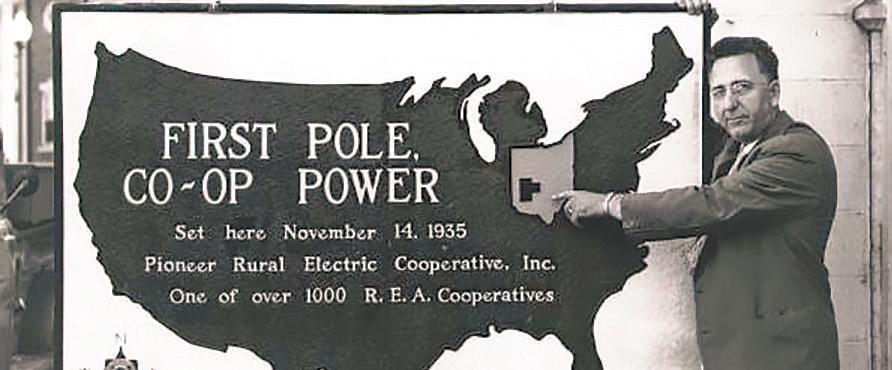
Line of defense: Co-ops aggressively work to guard sensitive systems and keep members’ data safe.
Pumpkins with personality: Co-op member turns a childhood hobby into a successful Halloween business.
Grand grains: One of the five main food groups, grains add numerous health benefits — and loads of satisfaction — to your mealtime.
News and other important information from your electric cooperative.
Traces, licks, and wallows: Bison, as they did elsewhere, left their mark on early Ohio.
What’s happening: October/ November events and other things to do around Ohio.



National/regional advertising inquiries, contact Cheryl Solomon
American MainStreet Publications 847-749-4875 | cheryl@amp.coop
Cooperative members:
Please report changes of address to your electric cooperative. Ohio Cooperative Living staff cannot process address changes.
Alliance for Audited Media Member

Fall foliage: Autumn is an opportunity for members to capture the vibrant colors of the season, as Washington Electric Cooperative member Toni Kellar shows in this photo of the shoreline at Seneca Lake in Noble County.


90 years ago, three farmers laid the groundwork as Ohio got a jump on rural electrification.
BY JODI BORGER
On November 14, 1935, nearly 500 people, including local, state, and national dignitaries, gathered in the shadow of the municipal light plant on the west bank of the Great Miami River in Piqua to watch as a wooden pole was set into the ground.
To most of the city-living population in Piqua (and everywhere else in the country, for that matter), it was just another utility pole. In truth, however, it marked the transformation of rural life in the United States. Owned by the fledgling Miami County Rural Electric Cooperative (known today as Pioneer Electric Cooperative), it was the first pole in the nation that had been financed by the brand-new Rural Electrification Administration — a key part of President Franklin Delano Roosevelt’s plan to pull the nation out of the Great Depression — and the first bit of solid evidence that electricity was indeed on its way to America’s farms.
And that pole was a testament to the efforts of three local farmers: Paul Boerger, Bill Joslin, and Leonard U. Hill. “The triumph of rural electrification was not inevitable,” says Tom Musick, the current president and general manager of Pioneer Electric. “It happened because ordinary people like Joslin, Boerger, and Hill believed progress belonged to everyone, not just those in cities. They saw electricity not as a privilege, but as a necessity.”
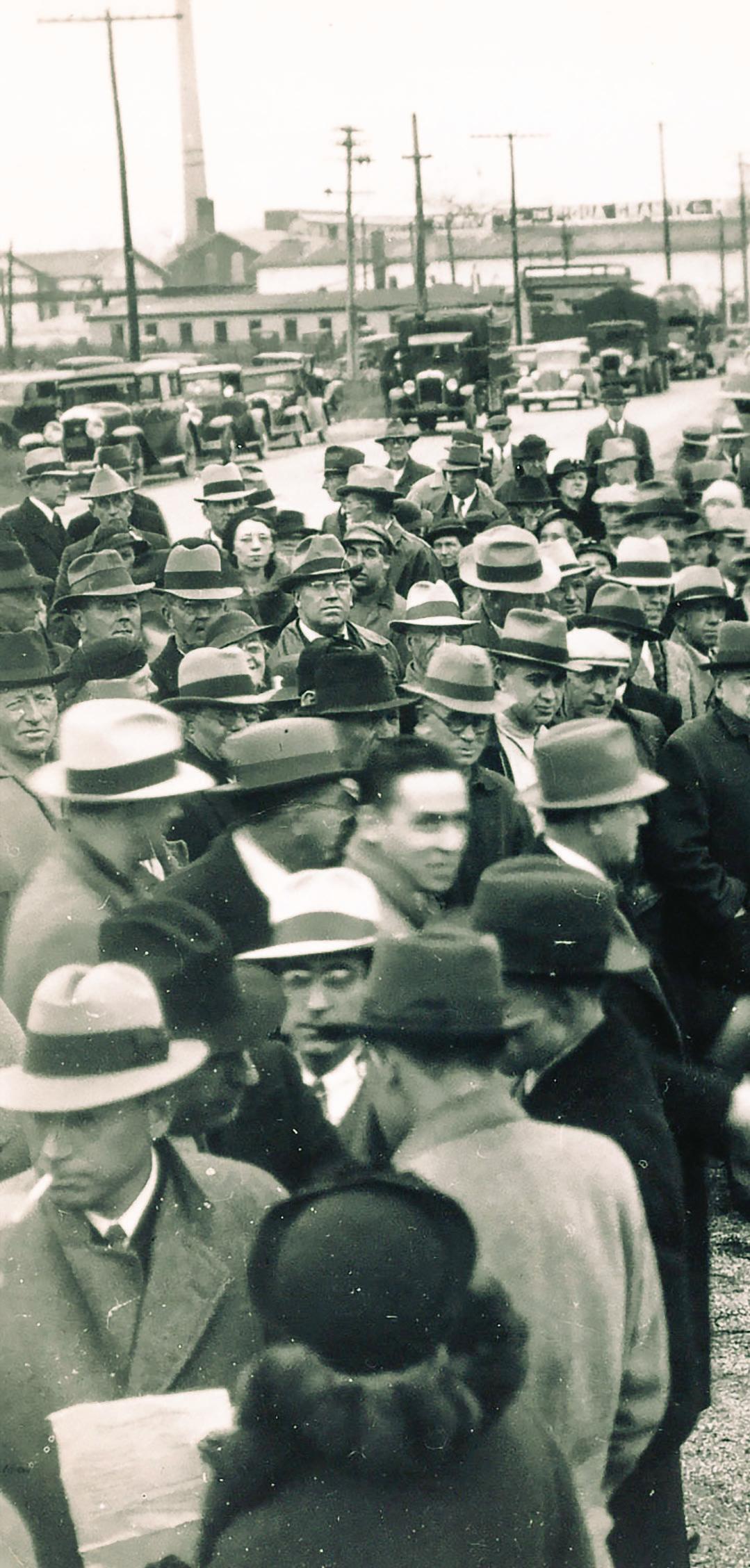
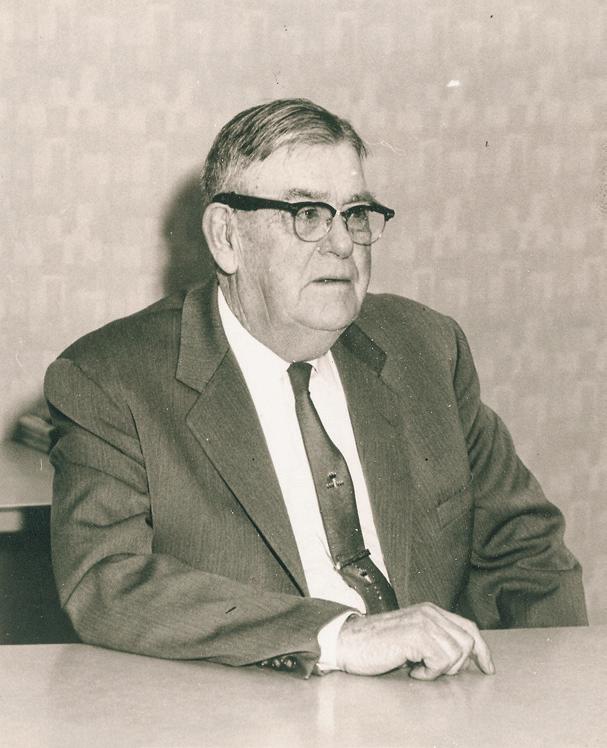
In early the 1930s, life without electricity was the norm for farm families in Ohio and across the country. While city households already enjoyed the convenience of things like lights, refrigerators, and radios, the utilities of the day declined to extend service to rural areas, arguing it was too costly and unprofitable. Only about one in 10 rural homes had electricity; their rooms were lit with kerosene lamps, water was pumped by hand, food cooked on wood stoves.
Joslin grew up in Sidney, and moved to Wyoming after high school to be a sheep rancher. After six years, he returned to Ohio to farm, and in 1917, he helped found the Shelby County Farm Bureau, laying the foundation for cooperative action. Reserved but determined, Joslin became known for his ability to earn trust and get results — he was well known for his mantra, “Let’s get it done” — and in 1935 he was the county farm bureau’s president.

Boerger had been raised in a town that had electricity, and when he began farming in rural Shelby County, he found it difficult to adapt to life without it. Carrying a lantern for chores was, for him, a daily reminder of the gap between city and country living.
Hill, who also hailed from Sidney, ran a farm in nearby Miami County. He and his neighbors had tried — unsuccessfully — to get electricity for their operations, so he knew firsthand both the hardships of farm life and the high cost demanded by private utilities, which was an insurmountable barrier to electrification. He was also active in the Farm Bureau, and in 1935 was the state secretary.
The Farm Bureau had already been working to find ways to expand electrification by the time Roosevelt’s New Deal created the REA in May of 1935, including sending letters to members outlining the possibilities
Continued on page 6
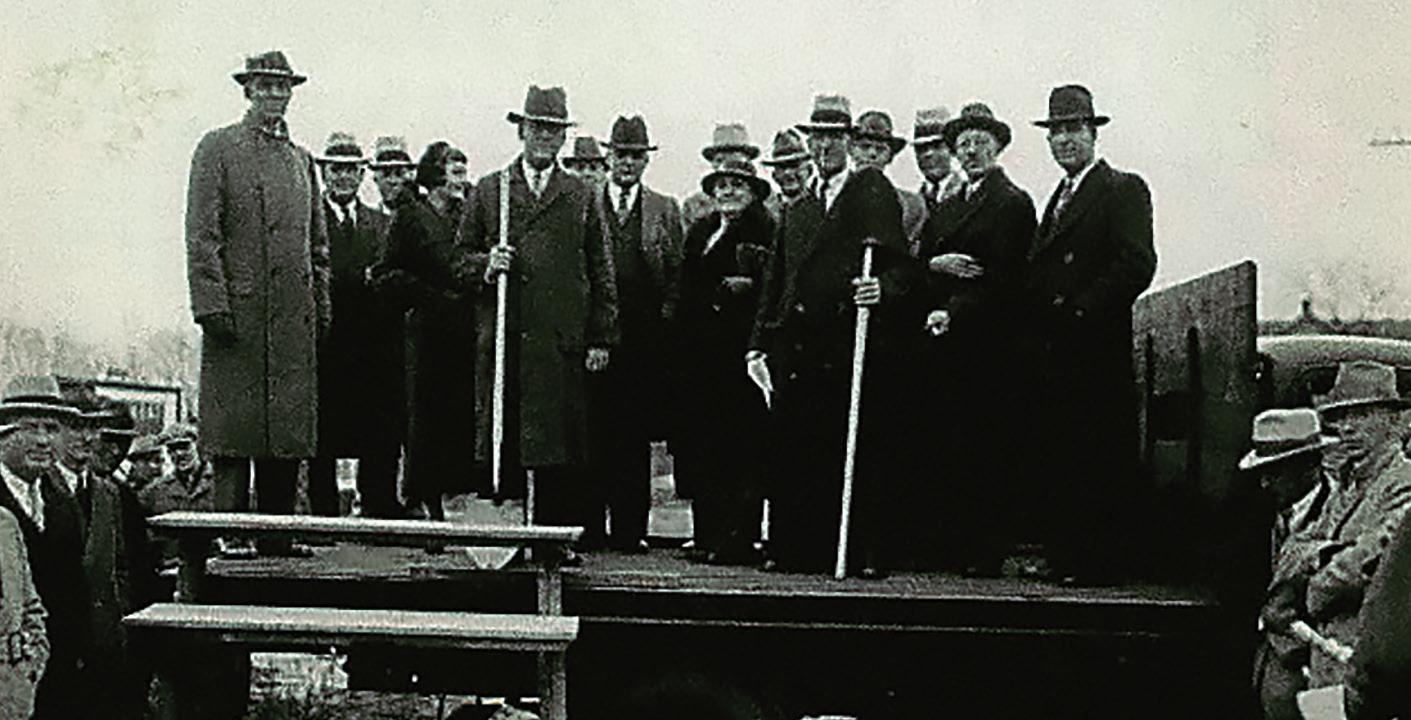
Continued from page 5
for farmers. One who took great interest in that letter was Boerger, and the idea was still fresh in his mind a few days later when he noticed Works Progress Administration workers digging ditches by hand. He thought a tractor could do more in an hour than 100 men in a day, and it occurred to him that such federal labor could be put to more constructive use — like building power lines.
Immediately, he took his idea to Joslin at the county Farm Bureau. At the time, Joslin was preparing to attend a meeting in Columbus to learn more about the new REA — and true to his mantra, immediately began to educate himself to figure out how to get it done. He started to organize farmers, complete loan applications, and convince neighbors that electrification was both possible and practical.
While state leaders were still developing a formal process, Boerger, too impatient to wait for official petitions, drafted his own and circulated it throughout Shelby County. It is believed to be the first rural electrification petition circulated in Ohio — possibly the first in the nation. Hill, meanwhile, as secretary of the Ohio Farm Bureau, played a key role in petitioning the REA for loans. So while Joslin organized the efforts and Boerger energized the people, Hill provided stability. When many farmers were skeptical of electricity or feared the costs, Hill reminded them that the cooperative belonged to local members and would be managed by them.
That was how, only five days after the first REA administrator was appointed, Joslin was among the Farm Bureau officials who went to Washington, D.C., ready to apply for a loan in the name of the Miami County Rural
Electric Cooperative. By November, the REA had allotted $254,000 for Project 1A Miami to construct 193 miles of new lines — starting at that first pole next to the Piqua Municipal Light Plant.
The Piqua Daily Call described it as an “epochal event.”
The Ohio Farmer wrote, “Perhaps the world’s greatest invention was the incandescent electric lamp. It symbolizes man’s triumph over the powers of darkness ... There was something of a spiritual glow, rivaling the electric light, in the eyes of those fortunate enough to be present at the ceremonies in Miami County last week when the first poles were set.”
The legacy
Hill became the first board president of the Miami County Rural Electric Cooperative, while Joslin was the first president of Shelby REMC. When the Miami, Shelby, and Champaign county co-ops merged to form Pioneer Electric Cooperative six months later, Joslin stayed as president with Hill as vice president. Joslin would remain in his position until 1961, overseeing the co-op’s expansion and ensuring thousands of homes were connected.
On June 15, 1936, the Charles McKinney residence, two miles south of Piqua, was the first home energized by the cooperative. By 1937, Pioneer had 3,000 members and over 1,000 miles of line. Today, Pioneer Electric Cooperative has more than 15,000 members and nearly 3,000 miles of line. Its members still include farmers and other rural residents, but also manufacturing plants, distribution centers, and a variety of small businesses.
So nearly 90 years after that first pole went up in Piqua, the impact of Joslin, Boerger, and Hill is still felt; every light switch flipped in those homes and businesses carries the legacy of the three farmers who refused to let their neighbors remain in the dark.








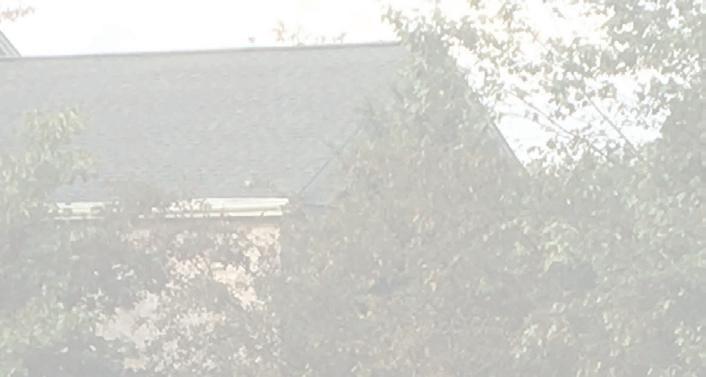

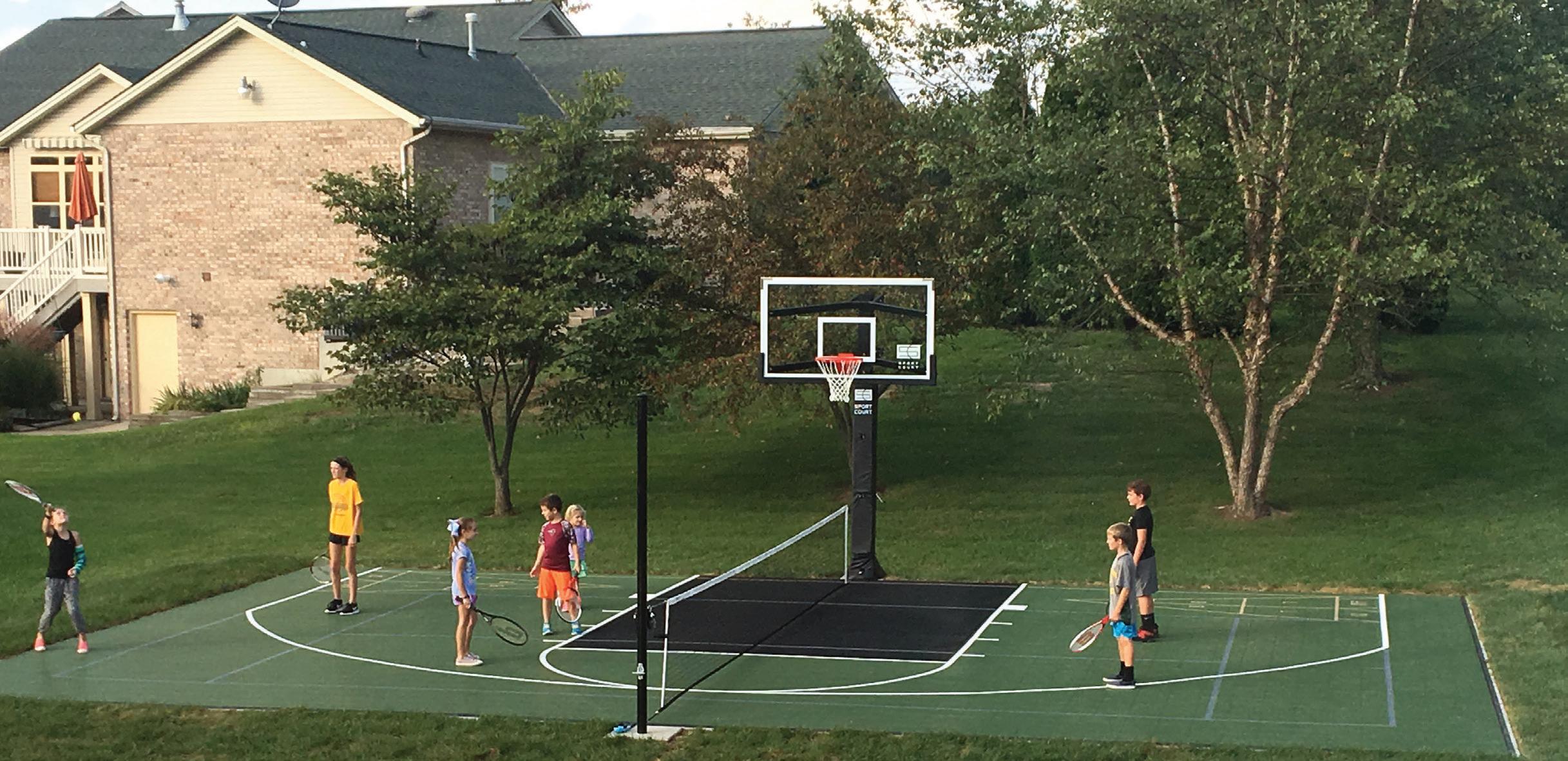






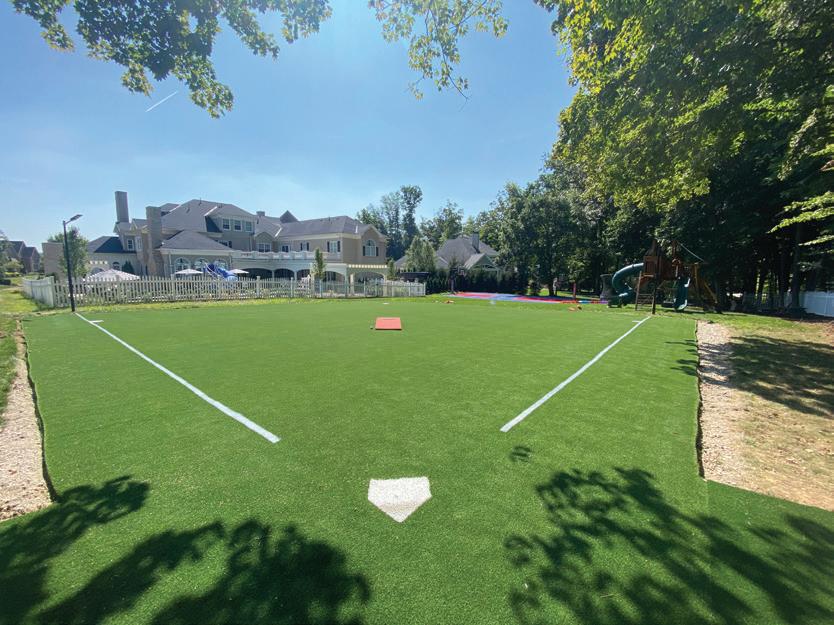








Co-ops aggressively work to guard sensitive systems and keep members’ data safe.
BY AMY HOWAT
“We look at cybersecurity like we look at workplace safety. It’s a key component in everything we do, and it’s part of everyone’s job, from the top down.”
In November 2021, a hacker using ransomware took down nearly the entire computer network at an electric cooperative in Colorado. The highly invasive cyberattack disabled not only Delta-Montrose Electric Association’s phone and email systems, but also the co-op’s customer management platform, meter data management system, mapping capability, and file servers.
Fortunately, the co-op managed to keep electricity flowing to members, but it took months to rebuild its network from the ground up. In the meantime, the co-op struggled with basic functions, including billing, because its meter-reading system was down.
In the spirit of the cooperative principle of Cooperation Among Cooperatives, Delta-Montrose has shared its story with co-ops around the country to help them avoid similar scenarios. Since October is national
Cybersecurity Awareness Month, Greg Niese, director of information technology for Ohio’s statewide association of electric co-ops, says it’s an ideal time for co-ops (and their members) to use those lessons to focus on protecting their own computer and digital systems.
“We look at cybersecurity like we look at workplace safety,” Niese says. “It’s a key component in everything we do, and it’s part of everyone’s job, from the top down.”
Cybersecurity is more critical now than ever, Niese says, as the same new technology that enhances co-ops’ ability to serve their members also brings additional risks for cyberattacks. The electric grid as a whole is being targeted more and in different ways than ever before — and not just by small groups or individuals, but by hostile nations looking for ways to infiltrate critical infrastructure in the U.S.
“If systems used to manage the grid are attacked, operations can be compromised,” Niese says.
“Cyberattacks — especially ransomware — can cripple core systems, including meter data management and automated meter reading systems, customer service platforms, grid control systems, and communication networks. That kind of disruption can do anything from delaying billing to interrupting power delivery altogether — any number of things that erode members’ trust.”
Niese and his team at OEC support information technology professionals at local co-ops to make sure
cyber defenses are robust, effective, and up-todate in an ever-evolving landscape of threats.
“We don’t dictate co-op policies and procedures, but we help each co-op understand where they are in their cybersecurity position,” Niese says. One such effort is RECAP, the Rural Electric Cyber Advancement Program, which involves a team of IT professionals conducting independent assessments at each co-op and identifying top priorities for improvement. “We make use of national standards from the Department of Energy or the National Institute of Standards and Technology to form a task list to help our co-ops prioritize and focus their efforts to effectively improve their cybersecurity.”
Through RECAP and other resources, such as the National Rural Electric Cooperative Association’s Cyber Goals program, co-ops are able to benchmark and improve their cyber posture, conduct regular assessments and tabletop exercises, and share threat intelligence and best practices.
“We see a lot of information sharing, both nationally and throughout the state,” Niese says. “We all participate in industry programs and training.”
But cybersecurity isn’t just a technology issue, Niese says — and it’s not just the responsibility of IT professionals.
“It’s a people issue,” he says. “Phishing, weak passwords, and poor cyber hygiene are common entry points for attackers. This makes training and awareness critical not only for co-op employees but also their members.” So co-ops continually educate staff on the latest cybersecurity issues and provide regular training on best practices and the importance of adhering to security protocols, cultivating internal cultures of cybersecurity awareness.
Communication from co-ops to members is also important, both to reassure members that co-ops take cyber threats seriously and to remind them to keep their own systems and data safe.
“After the Delta-Montrose cyberattack, their members lost a degree of trust,” Niese says. “Members expect transparency, modern protections, and communication, and we want them to know that their cooperative is constantly working to protect its own cyber resources and also keep its members’ data safe.”
Co-op member turns a childhood hobby into a successful Halloween business.
BY MARGIE WUEBKER
Along busy U.S. 33 in Mercer County, traffic often slows or even stops when drivers catch a glimpse of Karen Elshoff’s roadside stand.
As you might expect, that congestion hits a peak in October — prime time for the person known in these parts as the “Pumpkin Lady.”
Elshoff, a member of Saint Marys-based Midwest Electric, paints hundreds of pumpkins each year and sells them from the stand she’s set up at the edge of the small burg of Neptune. Her subjects range from whimsical cartoon characters and Halloween monsters to sports themes and aweinspiring superheroes.


something I can do.’ That was 30 years ago and I’m still doing it.”
After she read that story, she rounded up all the gourds and pumpkins she could get her hands on and painted them, just for fun. One year, she decided to take a load to a craft show in nearby Fort Recovery and, to her surprise and delight, she sold every single one.
She immediately got busy and painted more and set them on a picnic table in the front yard. “People would come to the door at all hours in the fall wanting to buy pumpkins,” she says. “We knew this was not going to work.” That was when she decided to relocate her sales to the current location at the Neptune property, with a stand set up in the shadow of the family camper.
When Karen was growing up, her family grew pumpkins and gourds in their backyard garden near Celina. “I read a story in one of my dad’s farm magazines about a girl who painted pumpkins instead of carving jacko’-lanterns,” she says. “I thought, ‘This is definitely
What was once merely her own personal hobby has since become a family business — her husband, two daughters, and two sons-in-law all lend helping hands as the busy fall season approaches.


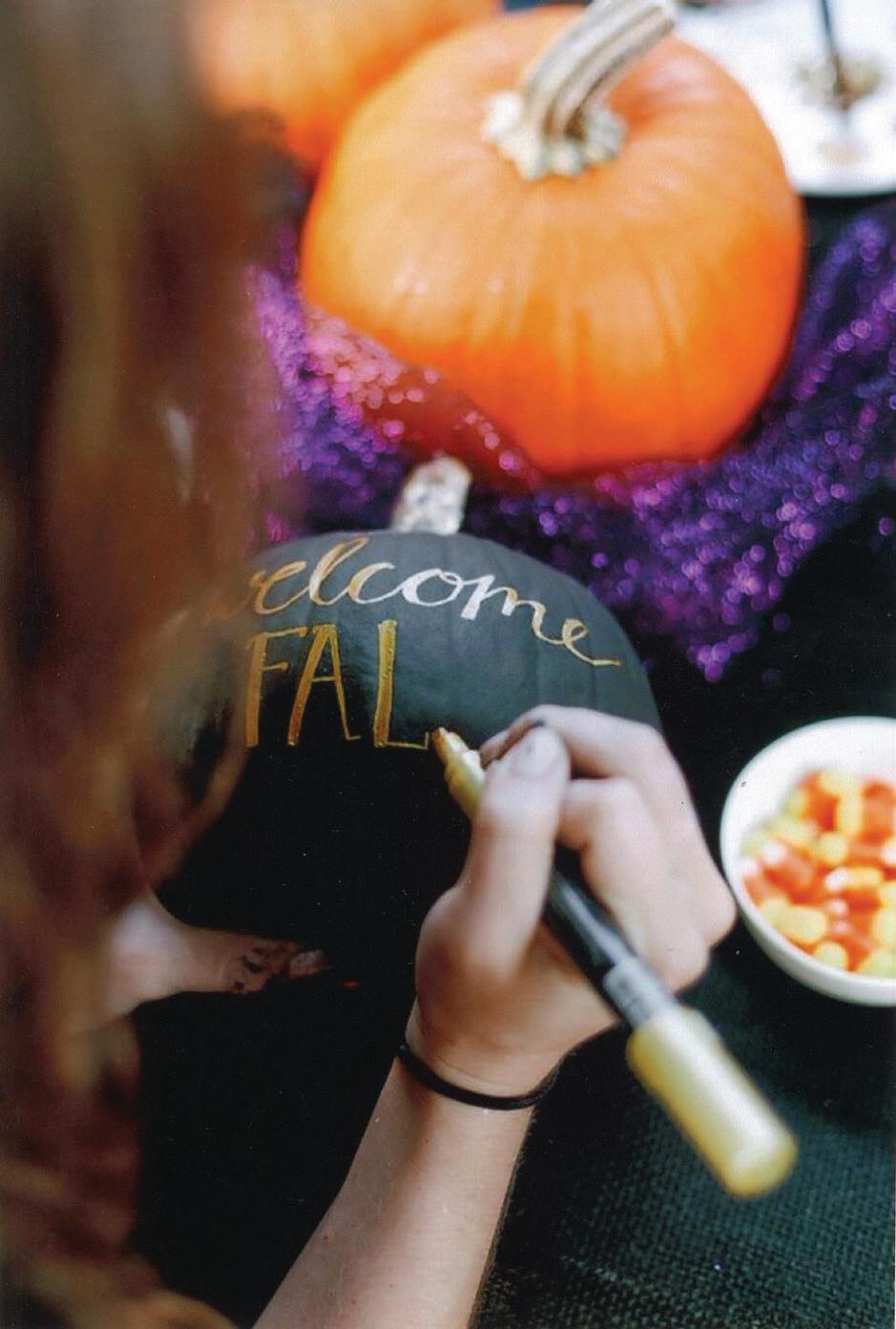
For starters, the garden no longer produces enough pumpkins to meet the demand, so the family travels to Amish produce auctions in Indiana to purchase pumpkins by the palletful.
Karen sits on the floor and pencils the designs by hand, using ideas gleaned from Pinterest, coloring books, comic books, movies, and even greeting cards. Other designs promote popular college teams like Ohio State and Notre Dame or professional teams like the Cleveland Browns and the Cincinnati Bengals.
“I’m not artistic but I like drawing silly faces,” she says. “We work assembly-line fashion in the garage with family members brushing on designated acrylic paint colors. It’s not unusual to have 20 pumpkins in various stages at any given time.”
Elshoff uses a black paint pen to darken the outline and “neaten” the design. Later she sprays on a clear-coat finish, though even with that added protection, she warns customers about placing pumpkins in direct sunlight or allowing them to remain in the pouring rain, because neither of those is good for the longevity of any pumpkin.
The current “pumpkin house” is actually a carport she’s equipped with shelves to display her wares. The selfservice operation is open dawn to dusk during the entire months of September and October. Her pumpkins range in price from $3 to $40 depending on size.
“Kids automatically run to the largest pumpkins,” she says with a smile. “Their moms end up pulling them over to smaller ones.”
Elshoff counts several generations among her clientele. People who once brought their children now come with grandchildren in tow. Even truck drivers pull over to buy pumpkins. There was a time when she accepted orders for custom designs, but given the time and effort involved, that’s no longer the case.
But she and the family do get to stop and take a breath during the winter months. “Business certainly tapers off the last two weeks of October,” she says. “And nobody is in the market for a pumpkin after Halloween.”
Karen’s Painted Pumpkins, 8140 U.S. Route 33, Celina (between Mercer and St. Marys). Find more on Facebook at www.facebook.com/ neptunepumpkinlady.



One of the five main food groups, grains add numerous health benefits — and loads of satisfaction — to your mealtime.
Prep: 10 minutes | Cook: 15 minutes | Servings: 4 main or 8 side
1 cup uncooked quinoa, rinsed
2 cups water
15.5-ounce can garbanzo beans, drained and rinsed
½ cup lemon juice
1 tablespoon olive oil
¼ teaspoon salt
12 ounces cherry tomatoes, cut in half large bunch fresh parsley, chopped
1/3 cup finely chopped red onion
8 ounces feta cheese, diced or crumbled
1 or 2 ripe avocados
In a small saucepan, bring quinoa and water to a boil. Reduce heat; cover and simmer about 15 minutes, until quinoa is tender and liquid is absorbed. Transfer to a large bowl, fluffing occasionally to let steam out. Mix in garbanzo beans, lemon juice, olive oil, and salt. Once quinoa mixture has cooled to room temperature, mix in tomatoes, parsley, onion, and feta. When ready to serve, top with slices of avocado. Store leftovers in fridge for up to a week. (Coat any leftover sliced avocado with lemon juice to prevent browning.)
Per main dish serving: 512 calories, 25 grams fat (9 grams saturated fat), 55 grams total carbohydrates, 979 milligrams sodium, 50 milligrams cholesterol, 114 grams fiber, 21 grams protein.

Prep: 15 minutes | Bake: 1 hour | Servings: 8
3 cups quick-cooking oats
¼ cup packed brown sugar
½ teaspoons baking soda
1 teaspoon baking powder
2 teaspoons cinnamon
½ teaspoon salt
2 large eggs, room temperature
1 cup mashed banana (about 3 ripe bananas)
¼ cup coconut oil, melted then cooled
¼ cup maple syrup or honey
¼ cup milk (or milk substitute)
1 teaspoon vanilla
1½ cups diced apples (a firm, tart variety) spreadable butter (optional)
With a food processor or blender, pulse oats into a flour (about a minute). In a medium bowl, mix together flour, brown sugar, baking soda, baking powder, cinnamon, and salt. In a large bowl, mix together eggs, mashed banana, coconut oil, maple syrup, milk, and vanilla. Add the flour mixture to the wet mixture and stir until fully combined, then fold in diced apples.
Preheat oven to 350 F. Coat loaf pan with nonstick cooking spray, then pour in batter. Bake 50 to 60 minutes or until toothpick comes out clean. Let cool before slicing. If desired, serve slices warm with a dab of butter. Store in an airtight container in fridge for up to a week or freeze for up to 2 months.
Per serving: 279 calories, 10 grams fat (6 grams saturated fat), 42 grams total carbohydrates, 282 milligrams sodium, 47 milligrams cholesterol, 4 grams fiber, 6 grams protein.

Prep: 10 minutes | Cook: 20 minutes | Servings: 4
1½ cups uncooked rice water and salt for rice, according to package instructions
14 ounces frozen chicken nuggets, tenders, or chunks
1 or 2 large oranges, zested, then juiced with pulp
2 tablespoons soy sauce
¼ cup white or rice vinegar
½ cup packed brown sugar
1 teaspoon garlic powder
1 tablespoon cornstarch mixed with 1 tablespoon water
Start by cooking rice and popping chicken nuggets in the oven, each according to their package instructions.
Meanwhile, in a medium saucepan, mix orange juice, orange zest, soy sauce, vinegar, brown sugar, and garlic powder. Bring to a boil over medium heat, then lower temperature a bit. Mix in cornstarch slurry and cook until sauce coats the back of a spoon. Remove from heat and cover with lid until the rice and chicken nuggets are ready. Divide rice onto plates, then top with sauce and chicken.
Per serving: 670 calories, 18 grams fat (4 grams saturated fat), 107 grams total carbs, 992 milligrams sodium, 32 milligrams cholesterol, 3 grams fiber, 19 grams protein.

Prep: 5 minutes | Cook: 12 minutes | Servings: 2
½ cup medium-grind bulgur*
1 to 2 cups milk (or milk alternative)
1 tablespoon maple syrup or honey
½ teaspoon cinnamon toppings of your choice#
In a medium saucepan, combine bulgur, 1 cup of milk, maple syrup, and cinnamon; bring to a boil, then quickly reduce heat to medium. Simmer, stirring regularly, adding more milk when it becomes too thick. At 12 minutes, test for doneness. Continue stirring until cooked to your preferred texture and thickness, from slightly chewy to quite soft. Cereal will continue to thicken when removed from heat. Split into two bowls and add toppings. Serve hot.
Per serving (not including toppings): 220 calories, 4 grams fat (2 grams saturated fat), 39 grams total carbohydrates, 54 milligrams sodium, 15 milligrams cholesterol, 5 grams fiber, 8 grams protein.
*May also be labeled medium-coarse or #2 bulgur. Bulgur wheat is a healthy, high-fiber whole grain that aids in digestion and weight management while lowering risk of cancer and heart disease.
#Suggested toppings: fresh or dried fruit, nuts, seeds, syrup, or honey (dried apricots, coconut, and maple syrup are shown).

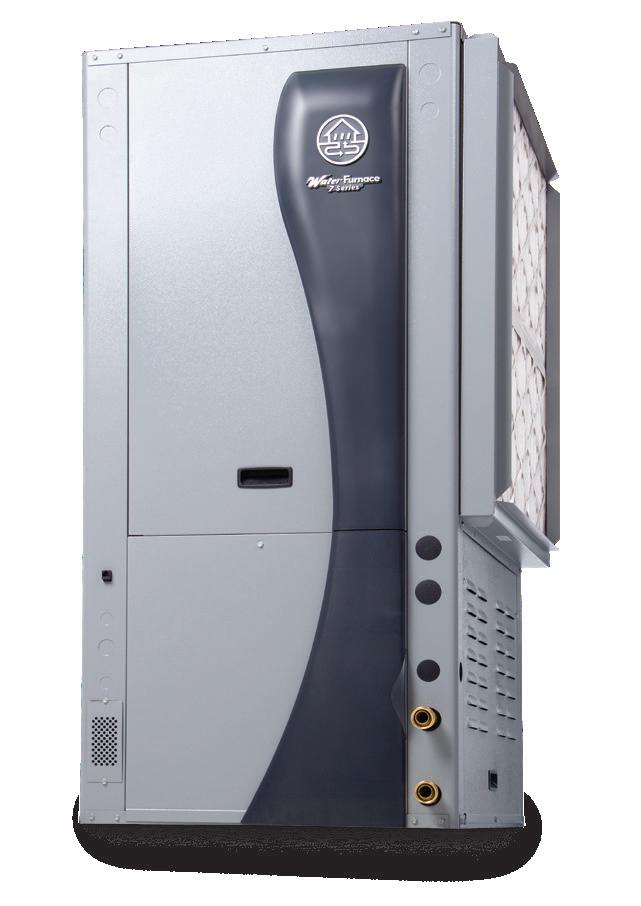
Protecting yourself online doesn’t have to be complicated. A few simple habits can reduce your risk of falling victim to cybercrime. These simple steps will help shield your personal information, protect your online accounts, and keep your devices secure.
1. Use long, unique, and complex passwords. Your passwords are the first line of defense between a criminal and your sensitive information. Here’s how to have amazing passwords:
> Every password should be a reasonable length. Long passwords can significantly overwhelm passwordcracking programs. Use a random mix of letters, numbers, and symbols.
> Every account needs a unique password. Unfortunately, making small changes like adding numbers or switching out an S with a $ doesn’t count as a unique password.
> If you’re wondering how to manage so many unique, long passwords, the answer is a password manager! There are many free, secure options. Password managers are the safest way to store your passwords.
2. Enable multifactor authentication, or MFA. MFA adds an extra security layer by requiring something more than just your password to log in. Think of it as using two locks on your digital door instead of only one. This could be:
> A one-time code sent to your phone
> A biometric scan like a fingerprint scan or FaceID
> A physical security key
MFA is available in SmartHub under Settings > Two-Factor Authentication. You can choose to receive an email or text message or use a code-generating app. Never share MFA codes with anyone — only scammers will ask for MFA codes.
3. Keep software updated. Software updates don’t just bring new features. They often fix security flaws that criminals exploit. It usually takes a few minutes, but updates are worth it. Butler Rural Electric Cooperative takes keeping software and devices updated a priority and works hard to make sure this happens. Here are some tips to keep your devices safe:
> Turn on automatic updates for your devices and apps. You can usually find these options in Settings.
> Don’t click Remind Me Later — install updates promptly for your operating systems, browsers, antivirus tools, and apps.
> Remember your phones, smartwatches, and tablets are computers, so keep these devices updated as well!
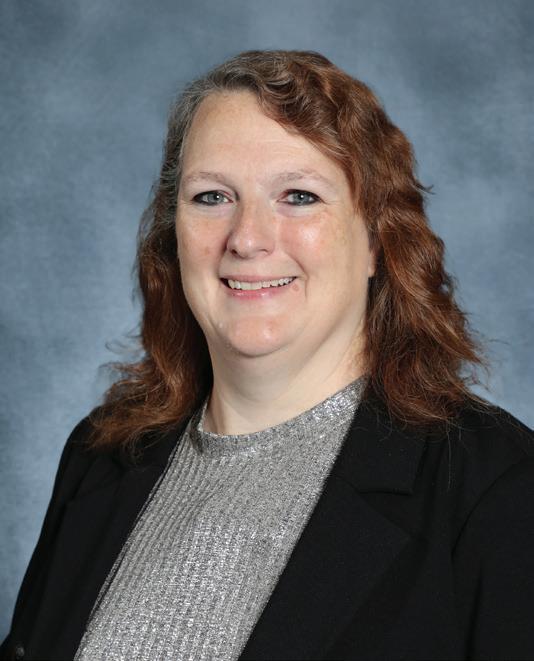
Laura Smith DIRECTOR OF CORPORATE AND MEMBER SERVICES
4. Look out for phishing and scams. Phishing remains the most common online threat. Criminals send fake emails, texts, or social media messages to trick you into revealing sensitive information or clicking malicious links. These messages aim to get you to click before you think by playing on your emotions. Scammers will even call you! Here’s how to look out for phishing and scams:
> Be highly skeptical of unexpected messages, especially those urging immediate action or asking for personal details.
> Phishing emails can light up positive emotions (“You’ve won our sweepstakes!”) or negative ones (“You’ve been hacked!”).
> Don’t click suspicious links or download unexpected attachments.
> Report phishing attempts to your email provider, social media platform, or the organization it appears the phishing email is from.
> If you’re unsure if a message is legit, ask a friend, family member, or someone you trust. A second set of eyes can be invaluable in spotting scams.
> Butler Rural Electric Cooperative employees are trained to spot phishing emails and scams. Through this training, we work hard to keep your information safe.
Consider the convenient, secure payment options below to avoid mail delays and
Reduce the stress of missing a payment or receiving a late charge by having your payment automatically removed from your checking or savings account on the due date.
Follow these steps to enroll in Auto Pay:
1. Log in to SmartHub
2. Select Bill & Pay, then Auto Pay Program
3. Accept the Auto Pay Terms & Conditions
4. Select Enroll under Auto Pay Enrollment
5. Follow the instructions and continue paying your bill until your statement reads “Automatic Payment –DO NOT PAY!”
Pay online through SmartHub by visiting butlerrural.coop or download the SmartHub app. If you don’t want to create a SmartHub account, use the Pay Now tab on the home screen of our website to quickly and securely make a payment.
Easily manage your account on the go and make payments with our free SmartHub app. Available on the App Store or Google Play Store — search for SmartHub.
Call 855-940-3867 to use our Self-Serve phone number. The automated system allows you to pay your bill 24 hours a day, seven days a week. You can also call our office at 513-867-4400 during normal business hours to pay with a card.
Pay your bill at the cooperative’s office at 3888 Stillwell Beckett Road in Oxford, Monday through Friday, 7:30 a.m. to 4:30 p.m. Our office has a drop box that can be used to make payments after hours or on the weekends. Please, do not put cash in the drop box.
Pay your electric bill at any First Financial Bank location with no charge. Visit the bank’s website for branch locations. Payments may take up to 24 hours (during normal business hours) to be received.
Did you attend our virtual annual meeting in April? If so, you could be the winner of a $50 bill credit. Congratulations to the August winners!
Sandra Arthur • Douglas A. Greene • Andrea S. Kuhlmann • Russ L. Obermeyer • Richard Swigert
New subscribers to Butler Rural Electric Cooperative’s paperless billing will receive a one-time $5 credit on their electric bill! Members who sign up for Auto Pay will be entered to win one of two $50 bill credits each month! Sign up for both programs in SmartHub, our free mobile app.
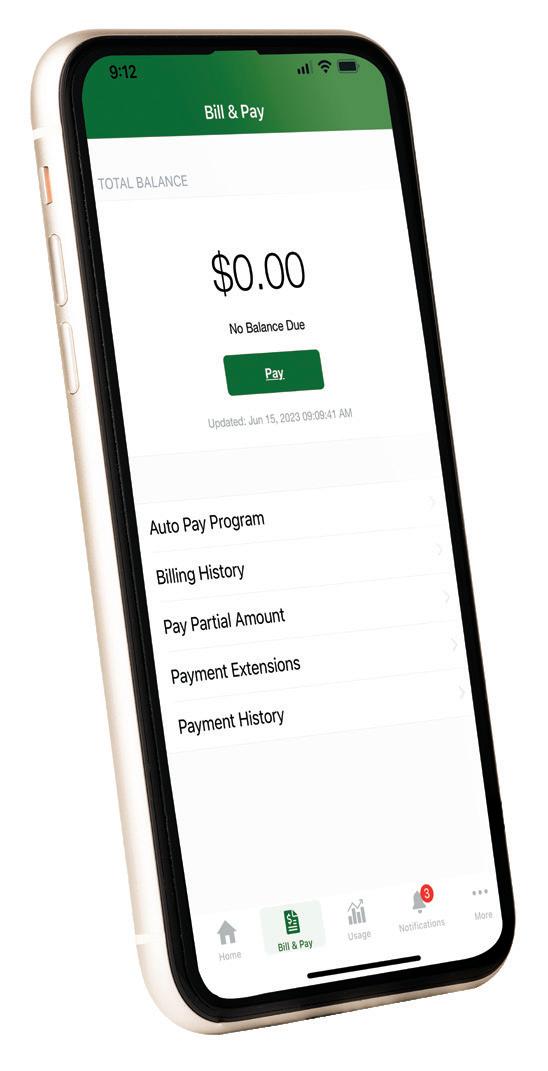
Hello to always on time
With AutoPay, you will never miss a payment again. Bills will automatically be paid from the account of your choice at no extra charge. You’ll no longer have to worry about mailing a check!

When we save money, you save money
By enrolling in paperless billing, Butler Rural Electric Cooperative saves money on postage and printing. As a not-for-profit organization, those savings help all members. You can still easily view your billing history and payment records online.


more To create a SmartHub account, visit butlerrural.coop


Download the SmartHub app on the Apple Store or Google Play. Once the app is open, type in “Butler Rural Electric Cooperative” as the provider. Your login information is the same for the website and mobile app.
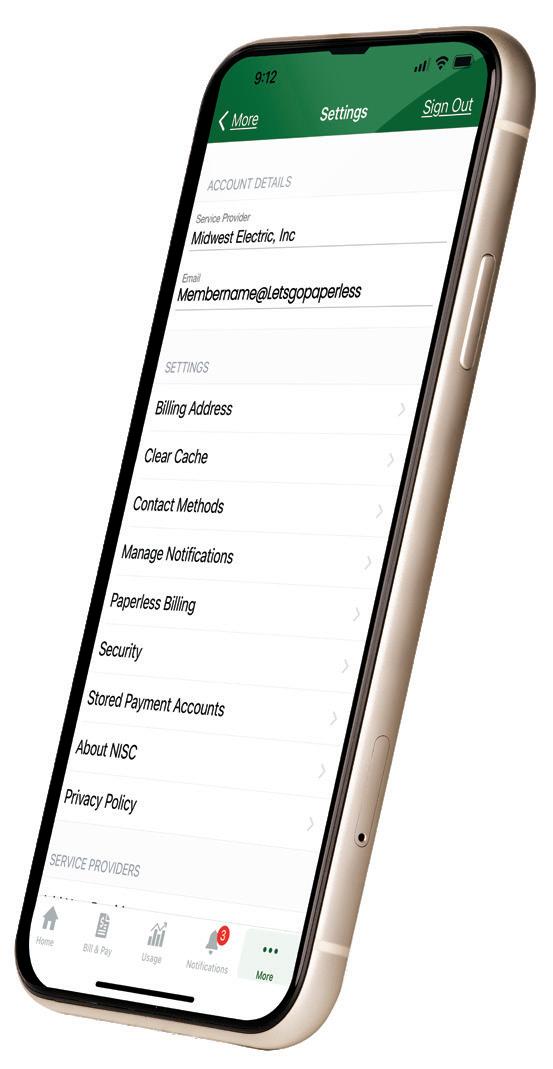
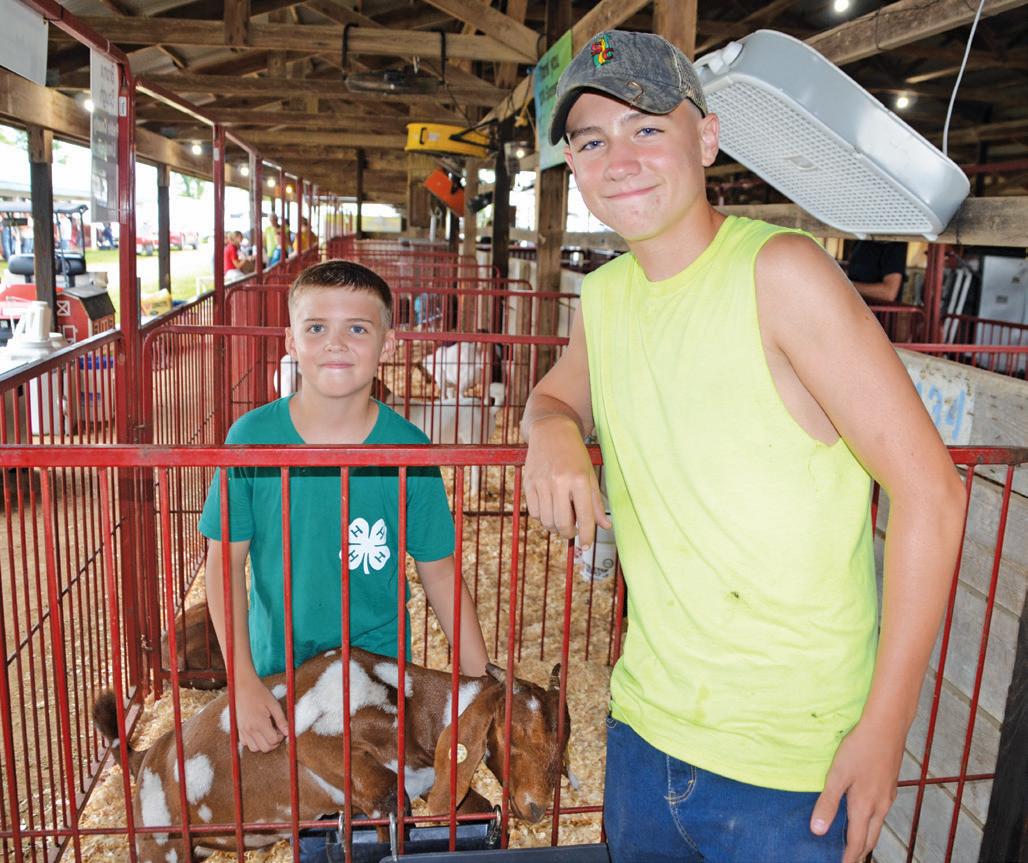

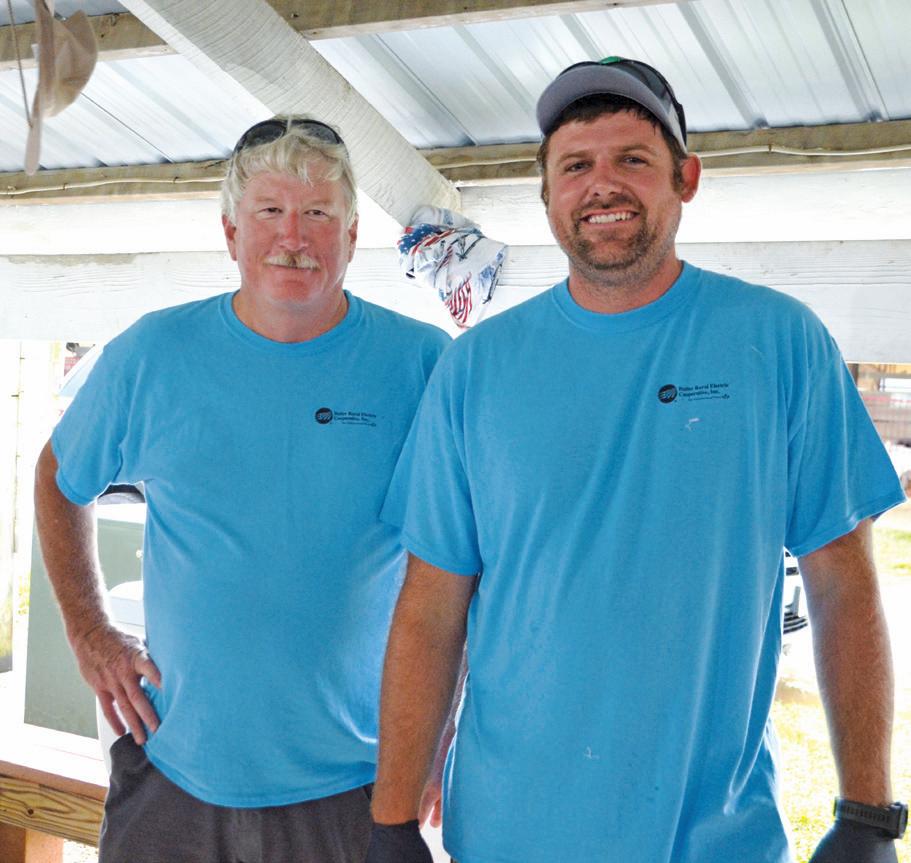
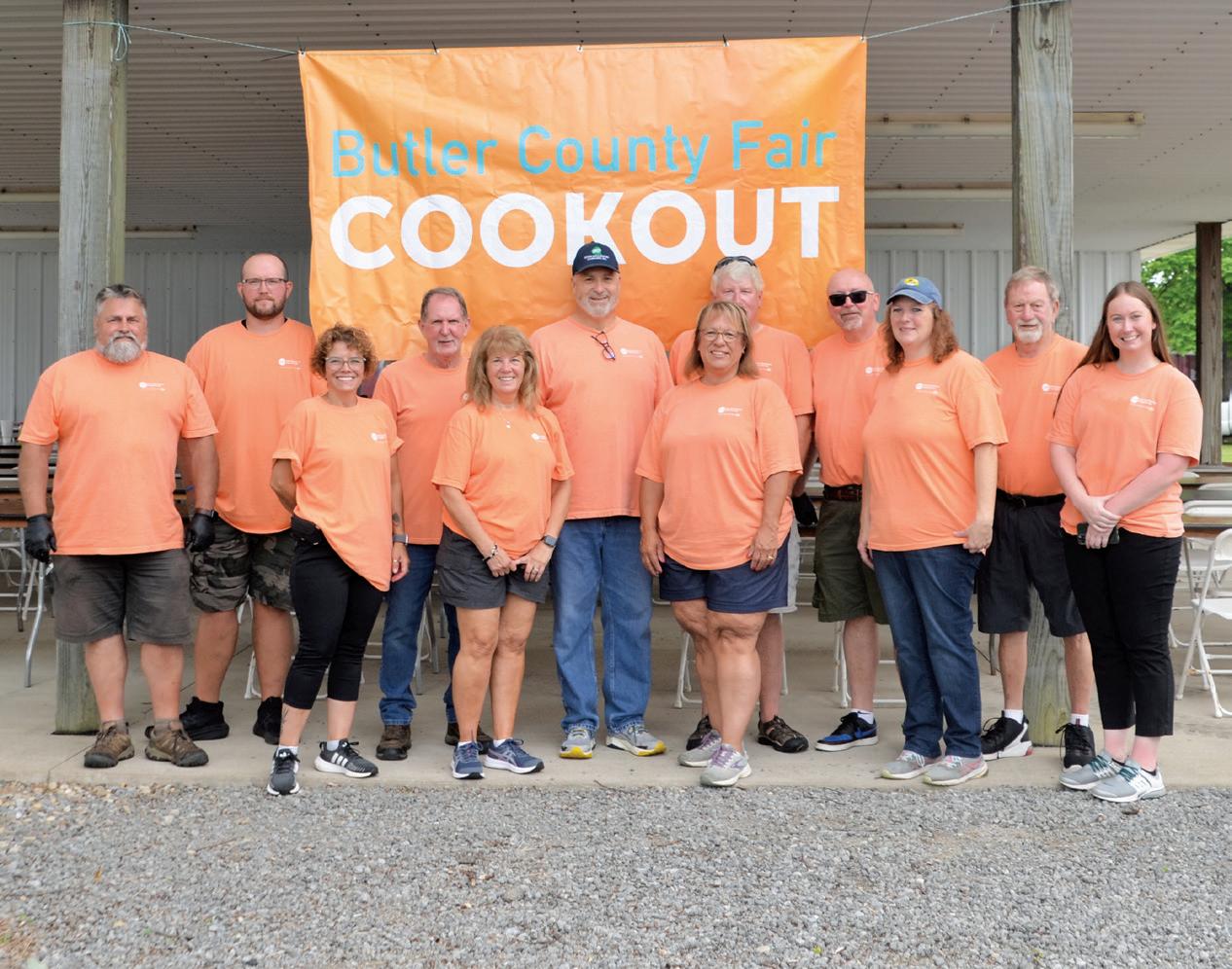
Butler Rural Electric Cooperative sponsored a cookout at the Butler County Fairgrounds on July 19. We also partnered with Darke Rural Electric Cooperative from Greenville to sponsor an exhibitor picnic at the Preble County Fairgrounds on July 25. During both events, families enjoyed free meals prepared by co-op employees and board members so they could relax after preparing for their county fairs.
Butler Rural Electric Cooperative participated in 4-H livestock sales at the Preble and Butler county fairs. We are grateful for the opportunity to invest in our communities and youth in these ways.
We hope all local 4-H and FFA exhibitors had great fair seasons. See you next year!
You won’t feel the difference when you adjust the thermostat by a few degrees, but your bank account will.

There’s no need to heat or cool an empty house if you’re away from home during the day. By programming your thermostat, you can save hundreds of dollars per year and the house will still be comfortable by the time you get home. Remember, when it comes to saving energy, you have the power!
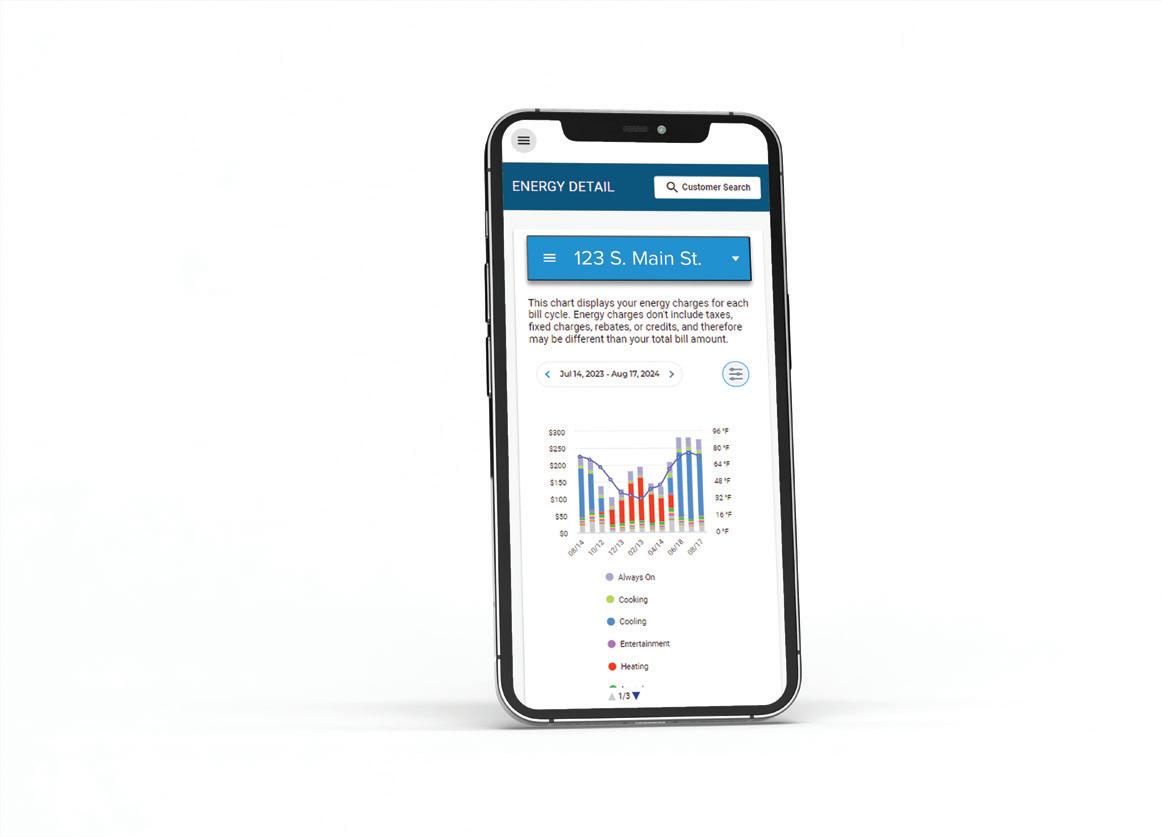
Find out how little changes add up with enhanced home use data, available within SmartHub.
1
2
You become a member of Butler Rural Electric Cooperative when you move into a home receiving power from the co-op.
Butler Rural Electric Cooperative keeps track of how much electricity you purchase throughout the year.
You’re more than a consumer — you’re an owner of Butler Rural Electric Cooperative. Capital credits represent this ownership and are one of the most unique and rewarding benefits you enjoy as a member.
This year, Butler Rural Electric Cooperative will distribute more than $2.1 million in capital credits to current and former members. The average residential member will receive a $157 capital credits check this year.
5
6
When we retire capital credits, members receive capital credits checks or bill credits in November.
Annually, Butler Rural Electric Cooperative’s Board of Trustees evaluates the financial stability of the co-op to determine if we can retire capital credits.
Unlike investor-owned utilities, which maximize profits to pay shareholders, your not-for-profit cooperative provides electricity at cost. At the end of the year, we return excess funds to members after all expenses have been covered.
What’s the difference between allocated and retired
Allocated capital credits appear as an entry on the permanent financial records and reflect your equity, or ownership, in Butler Rural Electric Cooperative. Every year, the cooperative notifies members of the amount added to your capital credits accounts through a printed notice with the bill you receive in March. Retired capital credits are equity that is returned to members in the form of checks or bill credits.
The capital credits amount you receive is based on the amount you paid for electric service during the years considered for capital credits retirement.
4
3
At the end of the year, any funds remaining after our expenses have been paid are allocated to members as capital credits.
Capital credits are used as operating capital for improvements and maintenance of our system. This reduces the need for loans, which helps keep costs down.
When capital credits are retired, a check or bill credit is issued to you. This year, Butler Rural Electric Cooperative’s Board of Trustees approved the retirement of capital credits from 2007, 2008, and 2024. The unretired capital credits, or “equity” of the cooperative, serves a vital function — allowing the cooperative to operate economically and effectively while investing in the infrastructure necessary to meet the needs of our members.
Will I receive capital credits checks every year?
The board of trustees must authorize a retirement before you receive a check. The board must consider the financial stability of the cooperative, the need for cash, and the availability of loan funds.
The notice of capital credits retirement is included with the electric bill you receive in October. You will find information about this year's capital credits retirement on the notice.
The amount of your retired capital credits is listed in the capital credits information box on the notice, along with your customer number. Use this number for any questions you have about your capital credits. The years of payout listed in the box are the years of capital credits our board of trustees approved to retire.
If your capital credits amount is under $20, your capital credits will continue to accumulate in your account unless you choose to apply the amount to your bill. If you want to apply the amount to your bill, contact us using one of the methods under “contact us” before Oct. 21.
If your capital credits amount is greater than $20, you will receive a check in November unless you choose to apply the amount to your bill. If you want to apply the amount to your bill, contact us using one of the methods under "contact us" before Oct. 21.
Sign up for Auto Apply and have your capital credits automatically applied to your bill each year! To sign up for Auto Apply, contact us using one of the methods under “contact us” before Oct. 21. If you chose Auto Apply previously, your capital credits will be applied to your bill.
Do one of the following by October 21:
> Visit butlerrural.coop and click on “Apply Capital Credits” on the home page. You can select the Auto Apply option on the form.
> E-mail capitalcredits@butlerrural.coop and provide your name, customer number, and capital credits amount. This information is listed on the notice of capital credits retirement with the bill you receive in October. Let us know in the e-mail if you would like to use Auto Apply.
> Call 513-867-4400 Monday through Friday, 7:30 a.m. to 4:30 p.m.
If you move outside our service territory, keep your address up to date in our system so we can continue
to send your capital credits checks. You can update your information at butlerrural.coop > My Account > Account Management > Capital Credits > Update Contact Information for Capital Credits or call 513-867-4400.
When a member or past member
More than $17,000 was raised by participants and sponsors of this year’s golf outing supporting Butler Rural Community Connection.
The co-op hosts the golf outing each year to raise money for Community Connection, which gives grants to local nonprofit organizations, schools, and emergency management services. Funding for Community Connection comes from co-op employees and members who voluntarily contribute to the program.
Butler Rural Community Connection was founded in 1994. Since then, over $1.7 million in grants has been awarded to local nonprofit organizations.
Thank you to all who attended the Links to Community Connection Golf Outing!
LUNCH SPONSOR altafiber
BEVERAGE CART SPONSOR Altec Industries
PRINTING MATERIALS SPONSORS
Utility System Engineering Watson Gravel


As winter approaches, now is the time to inspect your home for air leaks around windows. Leaks reduce indoor comfort and lead to higher heating costs. If you can see daylight around the edges of a window frame or if a window rattles slightly when touched, air is likely leaking.
Caulking and weatherstripping are simple, effective methods for sealing windows. These materials are available in a variety of compounds and forms, each designed for different types of surfaces. Choose the right product and apply it properly to reduce heat loss, improve comfort, and lower energy bills.
$1,200
A $1,200 rebate is offered for the purchase of a new geothermal system or $600 for the replacement of a geothermal system. Members with qualifying geothermal systems also receive a reduced kilowatt-hour rate on a portion of their electric use. The geothermal discount rate is a $.02 credit per kilowatt-hour used between 1,001 and 2,501 kilowatt-hours from September through May. Contact the co-op before having equipment installed.
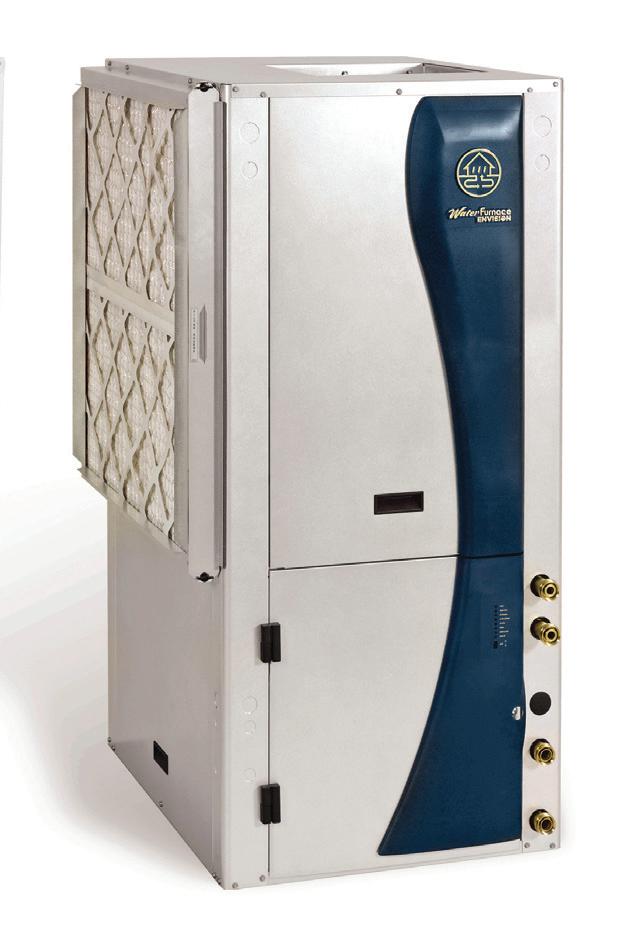
To qualify, the geothermal system must be an all-electric system, the only source of heat for the home, and have a minimum EER of 17.1 and minimum COP of 3.6. Equipment must be installed by a contractor on Butler Rural Electric Cooperative’s Geothermal Contractor List, available at butlerrural.coop > Energy Solutions > Member Rebates > Geothermal.
Butler Rural Electric Cooperative’s rebates on geothermal heating and cooling systems is limited. The offer expires when funds are depleted on a first-come, first-served basis, or when the program is discontinued.
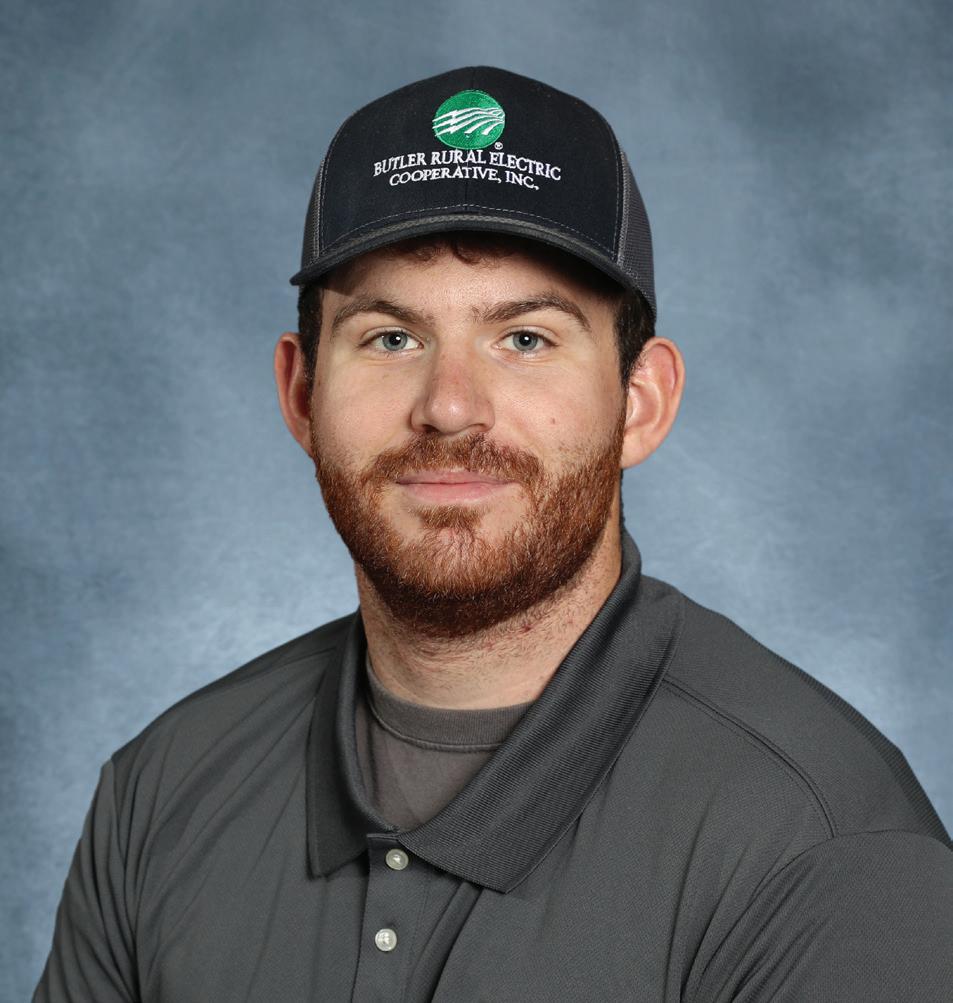
In July, Wade Bullock became Butler Rural Electric Cooperative’s newest apprentice lineworker. Wade has worked at the cooperative since 2024, most recently serving as our electrician.
Wade enjoys going to the gym, riding motorcycles, and spending time with family during his free time.
Congratulations, Wade!
It is your responsibility to notify Butler Rural Electric Cooperative before any changes to electric services are made. This applies to the installation of electric vehicle chargers that are level two or above. If you have an electric vehicle, let us know by completing the form at butlerrural.coop > Energy Solutions > Save Energy & Money > Electric Vehicles or by calling 513-867-4400.
This information can be found in Policy C1, which highlights member responsibilities. It’s important for us to know when electric vehicles and/or electric vehicle chargers are used so we can plan our electric system accordingly. EVs and EV chargers require increased infrastructure and we plan for this growth so we can continue to meet our member’s needs.
View this policy and others by logging in to SmartHub and select My Profile > Member Documentation.
BUTLER RURAL ELECTRIC

Butler Rural Electric Cooperative’s community solar program offers one of the cleanest and most affordable renewable energy sources available. By grouping solar panels together, costs are shared, power output is maximized, and the hassle of rooftop installation is avoided.
You can purchase subscriptions to Butler Rural Community Solar panels to support the benefits of solar energy without incurring upfront costs and without having solar panels located at your home. Generating energy with solar power is a renewable energy source.
Our community solar arrays are located on the corner of Lanes Mill and Stillwell Beckett roads, across from our office, and at other locations throughout Ohio.
The community solar rate is currently higher than energy produced by traditional resources, so participating in Butler Rural Community Solar will not decrease your monthly electric bill. The community solar rate is $0.11157 per kilowatt-hour. The average cost is approximately $1 per month per panel with the solar credit applied. This estimated cost will be in addition to participating members’ current electric bills.
Members who participate in Butler Rural Community Solar can lock in the community solar rate for up to 20 years.
This rate will remain constant for the duration of your agreement while other wholesale energy costs are subject to increase with market fluctuations.
You can subscribe to up to ten panels and can choose a five, 10, or 20 year agreement. The Butler Rural Community Solar rate will be fixed during the agreement.
Sign up for Butler Rural Community Solar today at butlerrural.coop > Energy Solutions > Member Programs > Community Solar or call 513-867-4400 today!
> Lock in a portion of your energy costs
> No upfront or maintenance costs
> Protect against inflation
> No changes to your property or installation barriers
> Immediately available solar power
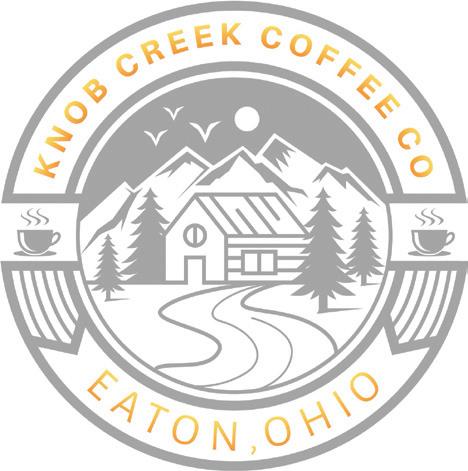
Visit our office in October to celebrate!
More details below.
Visit our office during normal business hours for a chance to win up to $100 in bill credits!
Join us Tuesday, October 21 from 8 a.m. to 2 p.m. at our office for a free drink from Knob Creek Coffee! Make sure to get your free drink voucher from our lobby before placing your order.
One bill credit and one drink per member while supplies last.















Leave a legacy for future generations, nothing embodies this sentiment quite like the enduring gift of gold from American Gold Reserve. With its intrinsic value and historical significance, gold represents stability and prosperity across generations, making it a cherished asset to pass down. Secure your family’s future with a gift that stands the test of time, ensuring legacy of financial security and enduring value.














a





American Gold Reserve is releasing Government issued $5 Gold American Eagles completely free of dealer mark-up for only $349 each. These beautiful $5 Gold American Eagles are a perfect way to enter the gold market. They are set for immediate public release and will sell out fast.








• Teach the importance of wealth preservation.
• Great way to pass on wealth to children and grand children.
• A symbolic act of the commitment to your family.
• Gold provides your children and grandchildren with a built-in safeguard during times of financial instability.










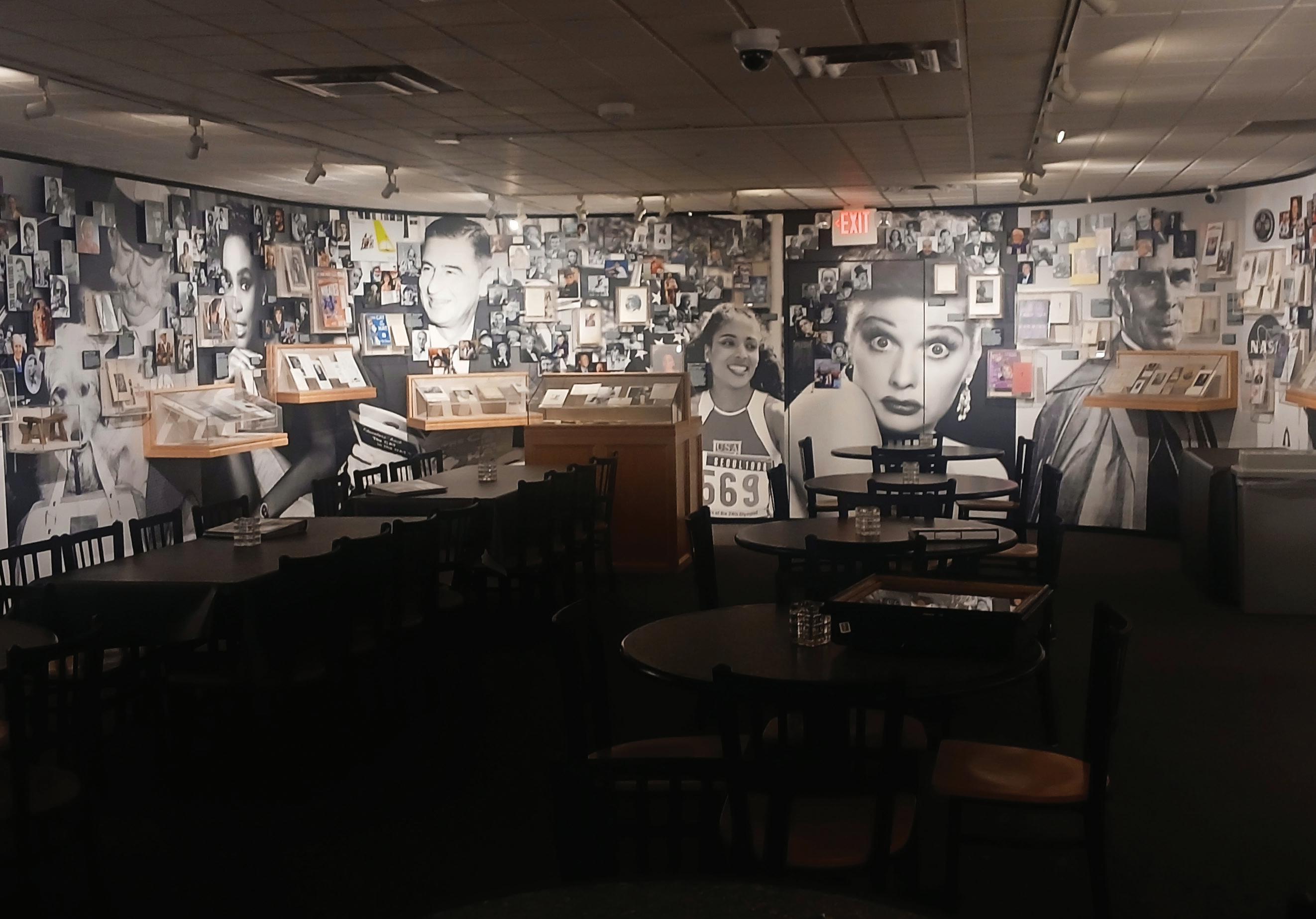
Dover museum honors people’s lives by commemorating their deaths.
BY JAMIE RHEIN
John Herzig was quite pleased with the latest addition to his ever-so-slightly notorious collection. Not that he’s a particular fan of her most recognizable song, “Killing Me Softly” (despite his line of work), but the program from Roberta Flack’s March 2025 funeral fit in quite nicely with the rest of his mementos, keepsakes, and other memorials from famous peoples’ lives — more specifically, from their deaths.
“My favorite thing to do is to hear people’s life stories,” says Herzig, who opened the Famous Endings Museum in his family-owned funeral home in Dover shortly after his plain old autograph collection started to transition into an assemblage of funeral memorabilia in 1996. “The museum keeps their stories alive.”
His passion for those stories is evident in every display, and walking through the museum wing of the TolandHerzig Funeral Home with Herzig is like a tour through history. He points to a picture of a mustachioed man with a mutt in his arms: “That’s Frank Inn, the animal trainer,” he says. “He spotted that dog at a shelter and named her ‘Higgins.’”
Higgins later gained fame as the movie mutt, “Benji,” and to Herzig, Inn’s story of a lifetime of rescuing dogs from euthanasia and boarding them until he could find
them homes is one that deserves to be remembered. “He supported at least 2,000 animals,” Herzig says. When Higgins eventually died after a long and fulfilling life, Inn gave her funeral, and Herzig has the program.
In fact, Herzig estimates he has more than 2,500 mementos commemorating the ends of people’s stories. But it was an unexpected bonus gift that arrived in 1996 with an autograph he had purchased that paved the way for it all. He had ordered an original signature of boxer Joe Louis, and when it arrived, the mailing tube also held a program from The Brown Bomber’s 1981 funeral.
Herzig says he immediately turned to his wife, Joyce, and said, “I think I have a new hobby.”
Funeral memorabilia are unusual in the first place, but the museum’s location in an actual funeral home makes it unique. Nevertheless, when people suggested he share his finds with the public, Herzig was doubtful anyone would come. Still, he eyed the casket and urn showroom as a potential spot for his hobby showcase. Soon, he contacted George Laurence, owner of Museum Acrylics in New Philadelphia, whose creative vision and expertise transformed that potential into a celebration.
Larger-than-life black-and-white images of notable people are organized into categories, from politicians
and actors to civil rights leaders, in a collage of humanity on all four walls. Smaller photographs add to the history and popular culture in a fascinating version of “I Spy.” Lucille Ball, Ronald Reagan, and Jackie Robinson are there, and obvious, but the displays include interpretive descriptions to decipher those who might be a bit less well known.
The cases display more than just programs. There’s a miniature Lamb Chop that was given out at ventriloquist Shari Lewis’s 1998 funeral; a tissue packet given to guests at Leslie Nielsen’s 2010 funeral, emblazoned with “Stop crying!!! This is supposed to be a fun night. Love and laughs, Leslie;” and a (preserved) cookie from Rodney Dangerfield’s funeral with an imprint of the comedian’s face.
The collection includes historic items as well: a lantern from President Lincoln’s hearse, the wooden embalming block used to rest outlaw Jesse James’s head as the body was prepared for burial, a guest list handwritten by Joe DiMaggio as he was planning the funeral of Marilyn Monroe, and the accordion played by Navy musician Graham Jackson at the funeral of President Franklin Delano Roosevelt.
Herzig’s finds come from all over. Comedian Pat Paulsen’s family members came to the museum one time and when they saw their relative’s funeral program already there, offered up that of family friend Tommy Smothers. “One day I get a package from England with the Queen Mother’s funeral program. I think it must have been from a custodian.”
When Paul Newman died in 2008, Herzig sent a condolence card and a donation to Newman’s Hole in the Wall Camp charity with a request for a copy of the funeral program — it landed him an invitation to the actual memorial service at Lincoln Center in New York City. Herzig does not attend many funerals apart from those in Dover, but he turned to his wife and asked, “Joyce, what do you say we get away for a couple of days?”
As Herzig’s collection has grown, only 10% is on display at a given time. But the shelves show that in death, everyone is created equal.
Grammy-winning musician Prince’s funeral items are next to those of Arch West, the inventor of the Red Solo Cup.
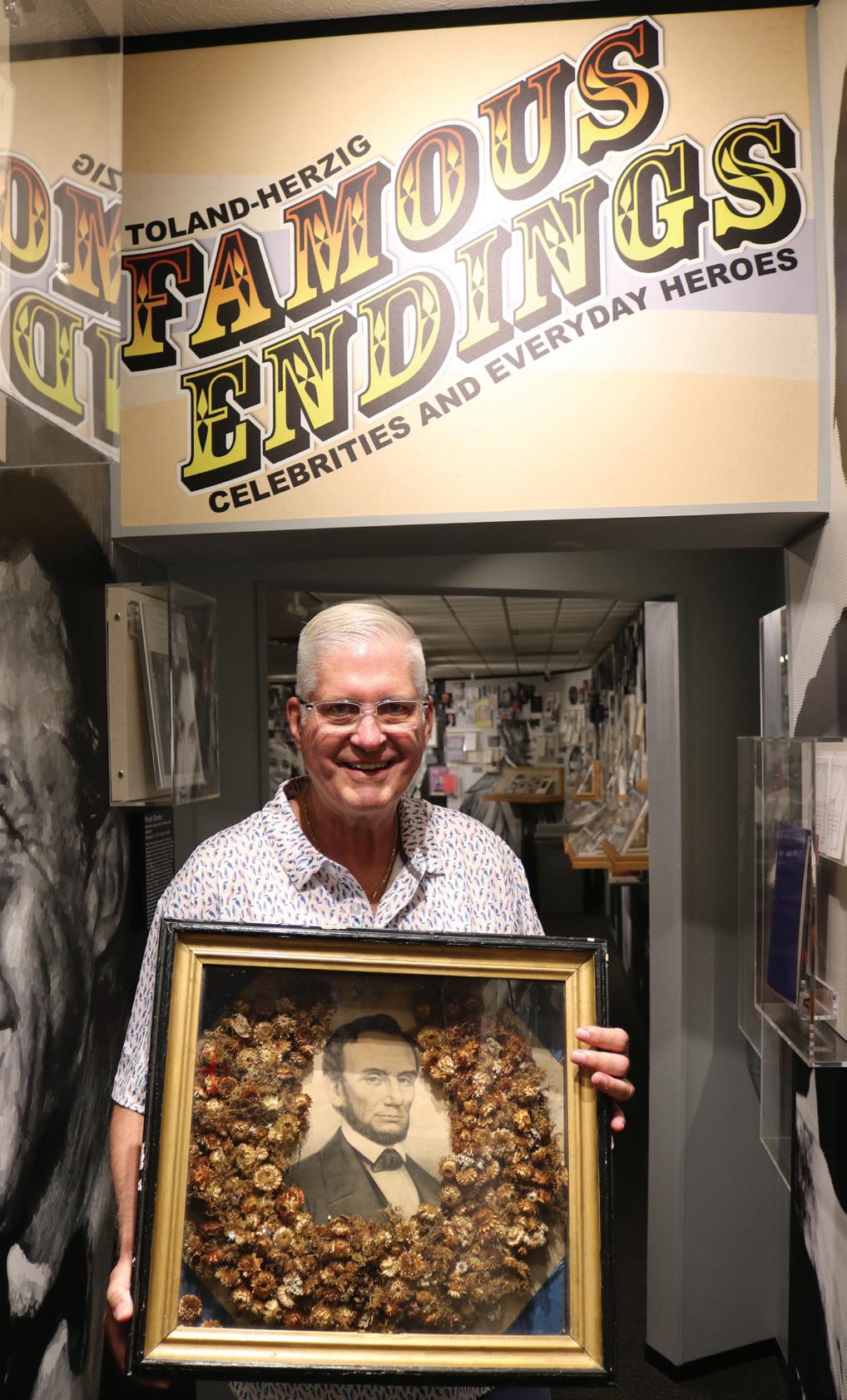
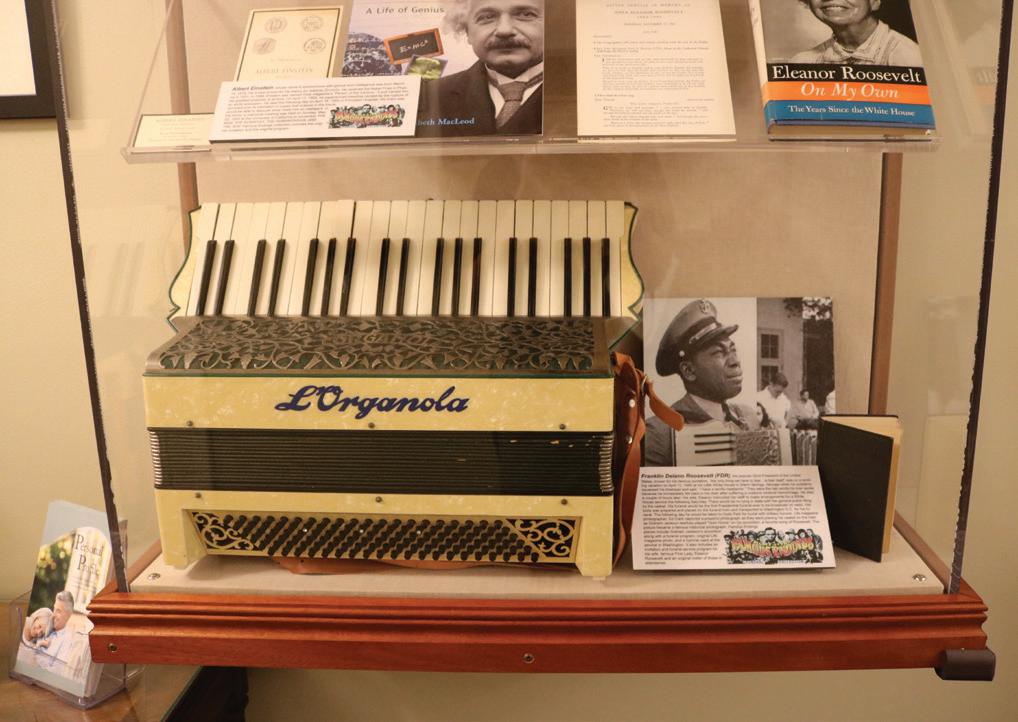

Acclaimed actress Mary Tyler Moore and rock drummer Neil Peart share space with Peter Frates, who started the Ice Bucket Challenge to raise money for ALS.
Some people’s funeral cards, like that of Donald Featherstone, the original creator of pink flamingo lawn art, offer simple missives on living life: “Don’t take life too seriously,” it reads, “you’re not getting out of it alive anyway.”
Famous Endings Museum, 803 N. Wooster Ave., Dover. Free. Open 9 a.m.–5 p.m. Mon.-Fri., or call 330-343-6132 to arrange a group tour.
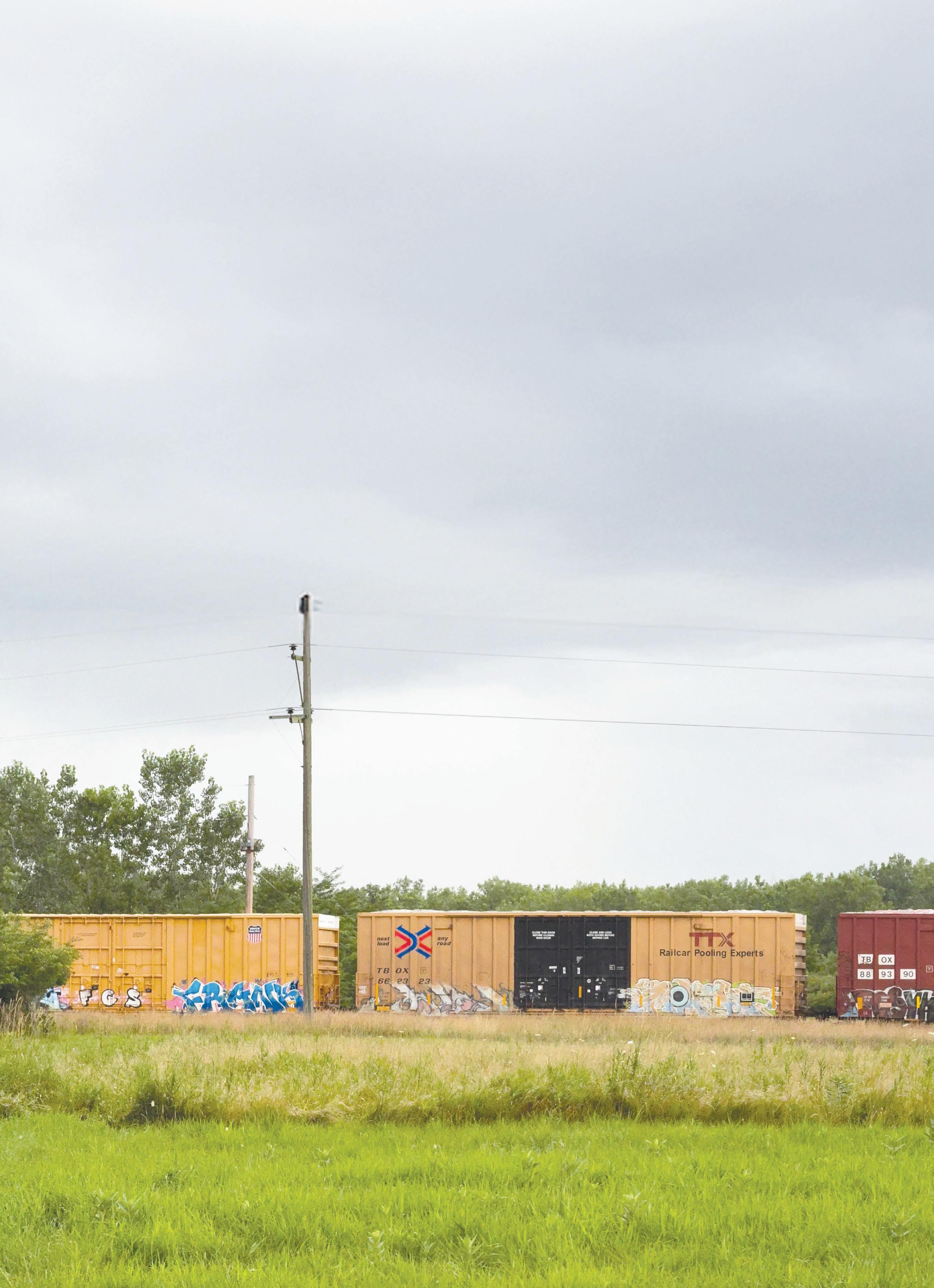
Getting stuck at a railroad crossing may be a bummer, but it can also be an opportunity to glimpse the handiwork of mysterious artists you will never meet and whose work you likely will never see again.
Editor’s note: Port Clinton-based photographer and writer James Proffitt traveled hundreds of miles between countless railroad crossings on Ohio’s highways and back roads, spent dozens of hours suspiciously loitering around the state’s train tracks and rail yards, and drew numerous funny looks and curious questions from bystanders and security guards alike, to document train graffiti — rolling galleries that often pass, unnoticed, right before our eyes.
At night, look fast! You have just about one second to glimpse, evaluate, and appreciate the fleeting displays.

The great majority of trains rolling through Ohio pull freight — with a variety of cars specifically designed to carry a host of goods and products. Boxcars are the most common freight cars by far, and with their broad, open sides, they make fine canvases.
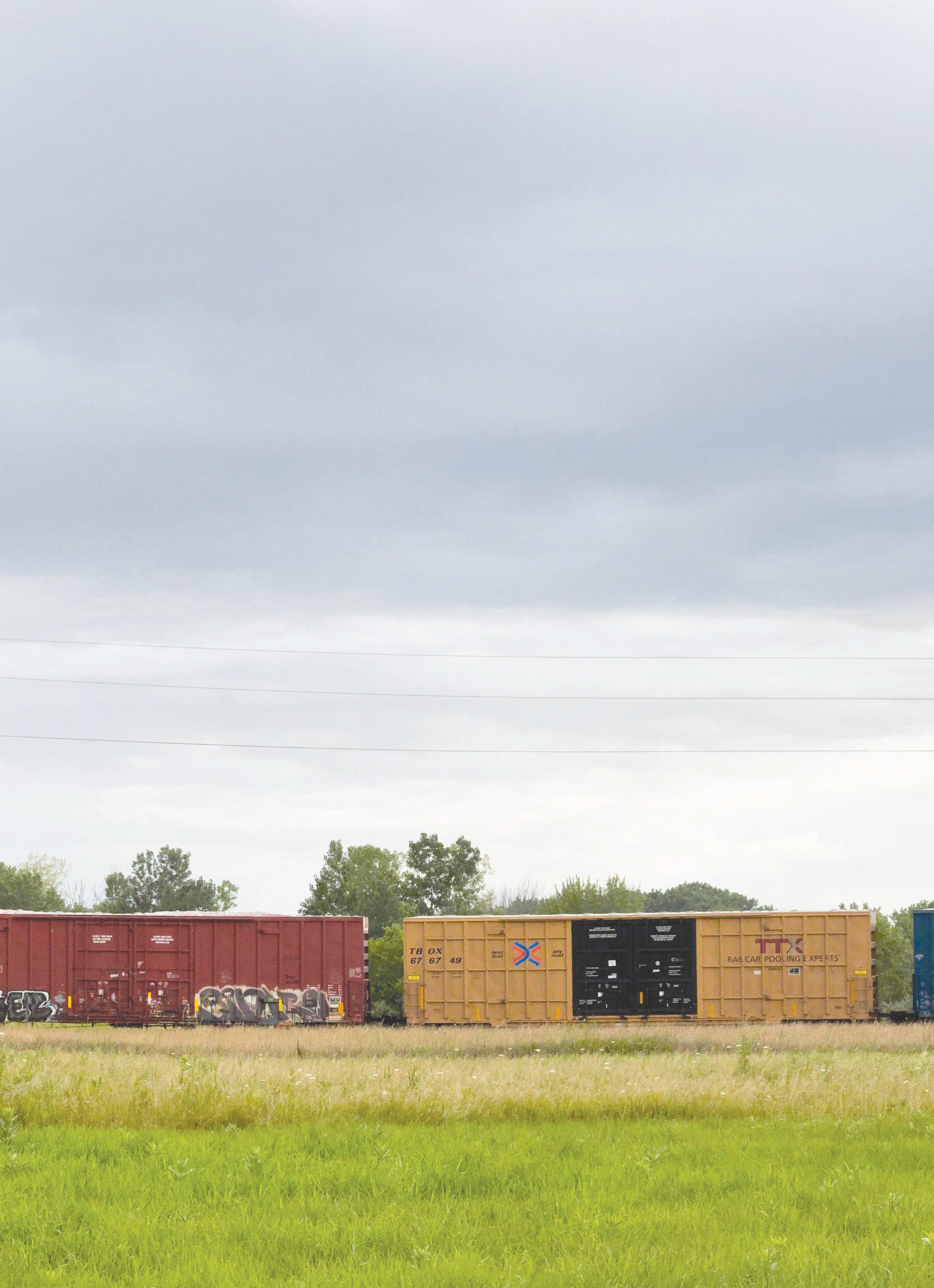

Trains often are covered with works from slapdash to sublime. Favorite subjects include political cartoons, celebrity satire, inspirational quotes, fantasy, and whimsy in all its many forms.

Rail cars that transport new vehicles, such as these crossing U.S. 50 in Addyston, are a favorite of artists for their smooth, wide-open spaces. Some cars feature work 15 feet off the ground. How do taggers reach so high? With paint rollers and extension poles. On larger pieces, teams of three or more artists often work together to cover entire cars.

To be certain, spray-painting railcars is illegal and dangerous. Most graffiti is born near rail yards in larger cities, like the Queensgate yard in Cincinnati, where the cars are plentiful and often don’t move for long periods of time.
When railroad operators switch panels on those car-hauling cars, they can create unlikely combinations.
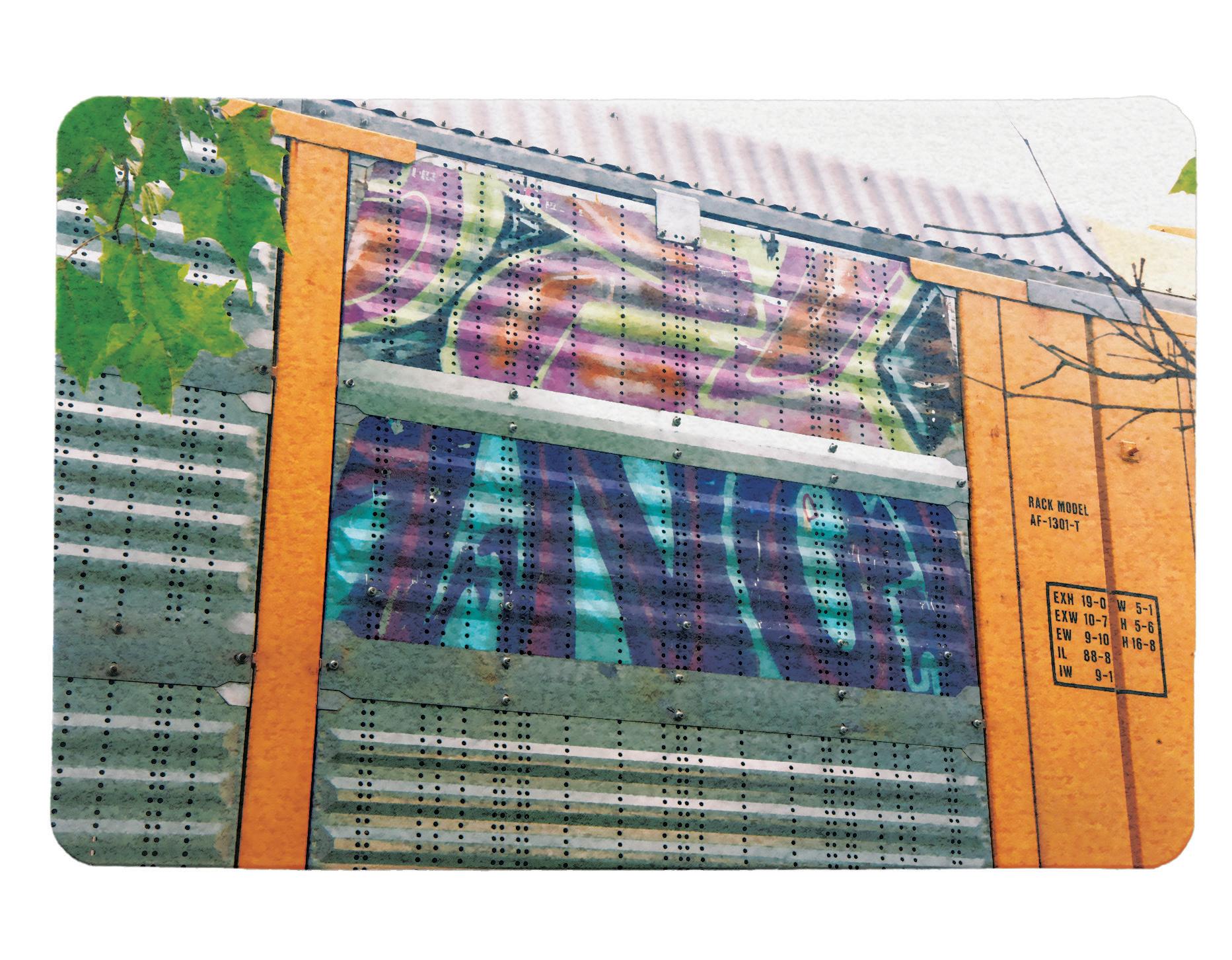
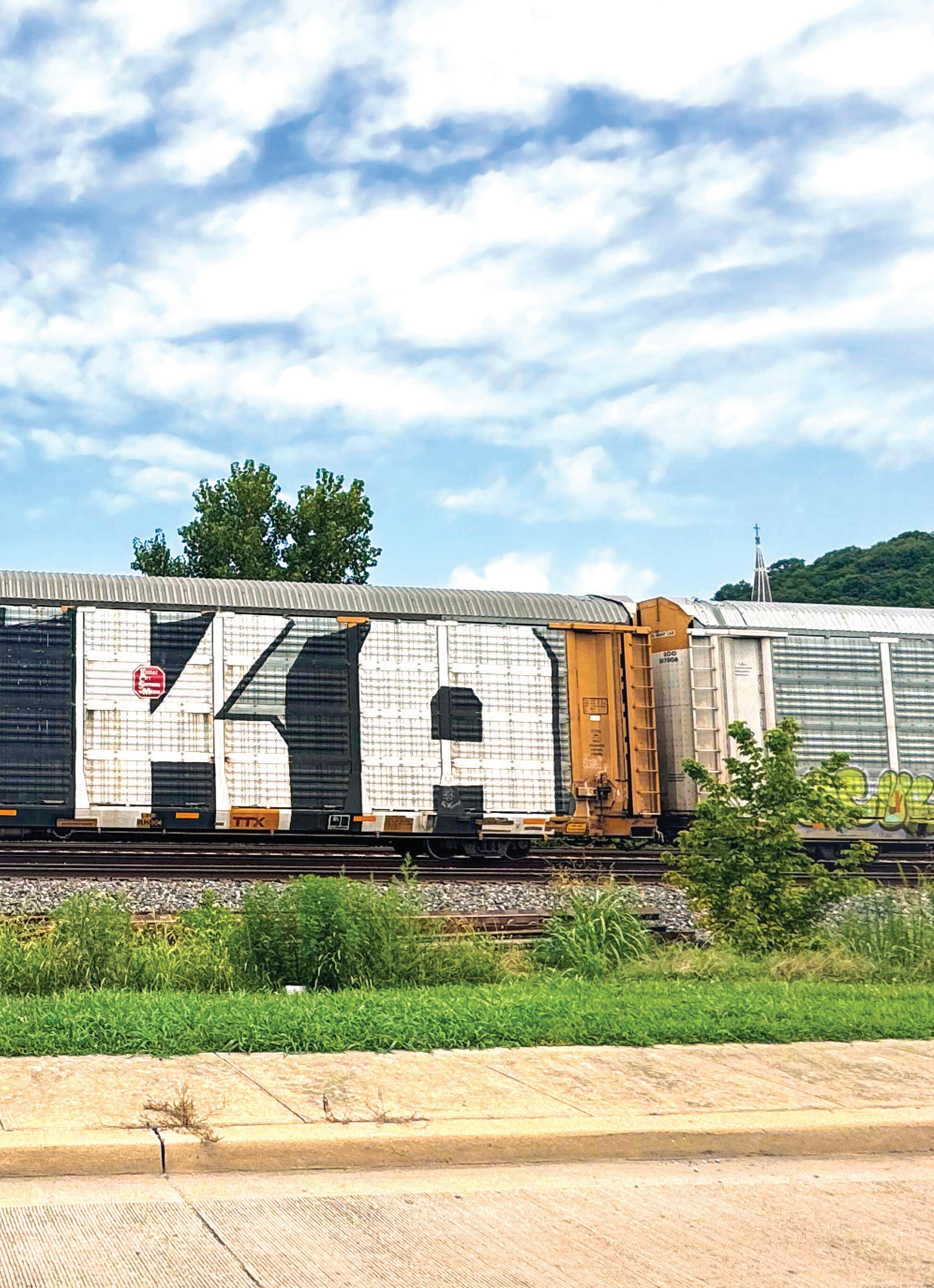
Notice that artists will often respect the safety and operational markings on cars to make it less likely their work will be either scrubbed off or painted over — because as their signatures often show, the artists most certainly think highly of their work.


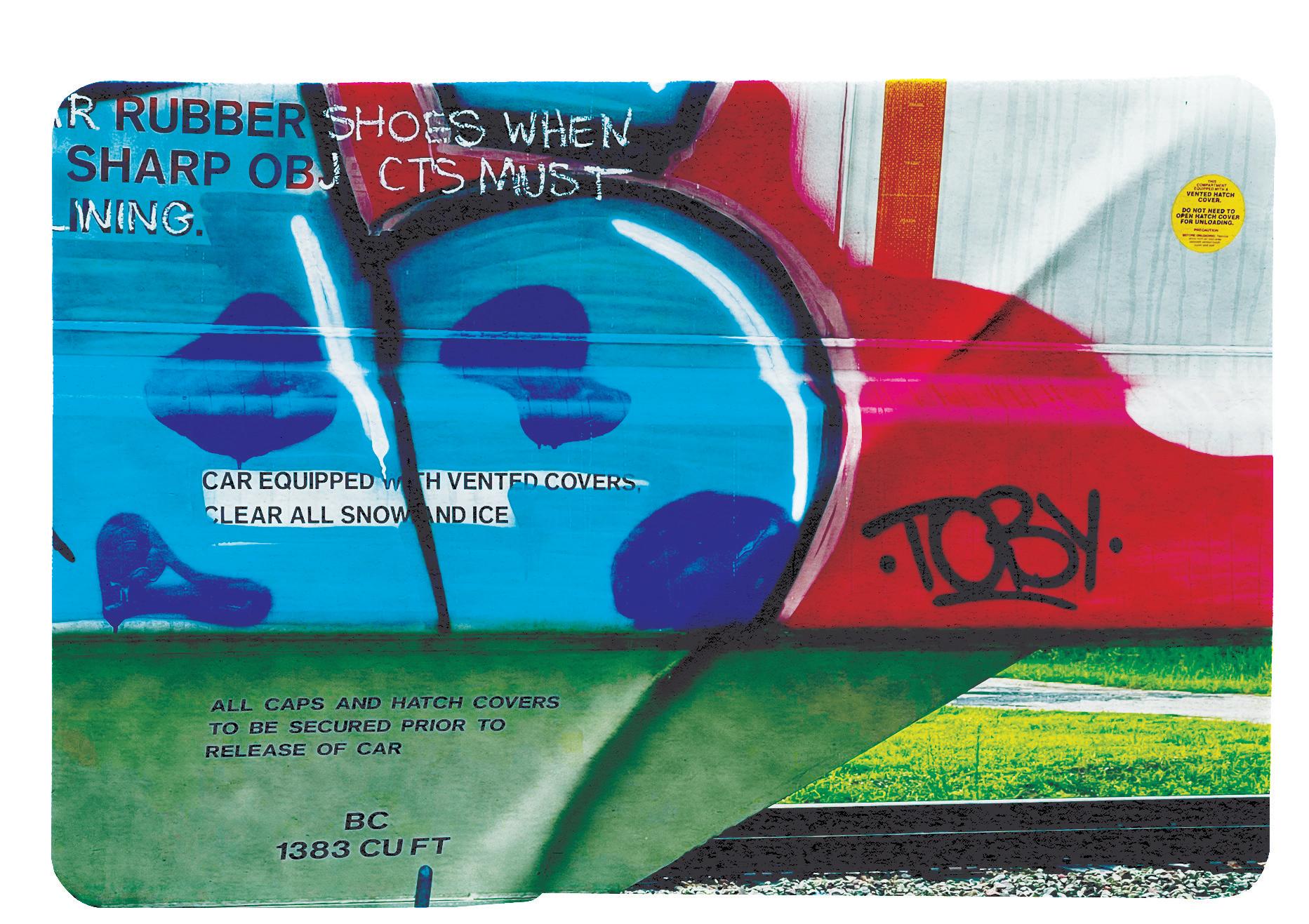



















































































Bison, as they did elsewhere, left their mark on early Ohio.





- J.P. Morgan

•
•
•
•












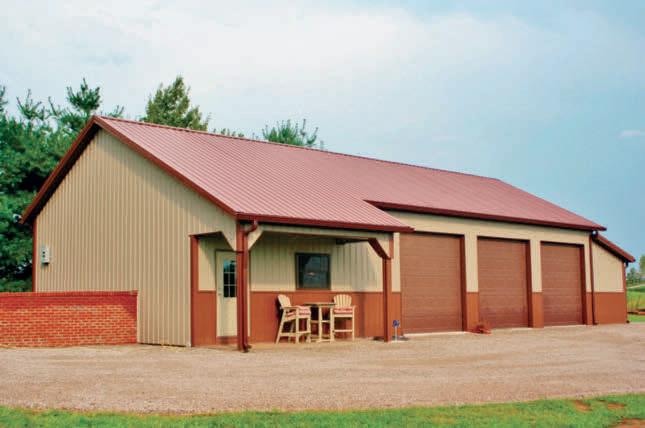


THROUGH OCT. 19 – NWORRP Pumpkin Train, 12505 Co. Rd. 99, Findlay, Sat./Sun. 1–5 p.m. $3; 12 and under, $2. Ride our quarter-scale train to the pumpkin patch for that special pumpkin, load it on the train’s flatcar, and return to the station. Enjoy games, decorations, and family activities. 419-423-2995, www. facebook.com/nworrp, or www.nworrp.org.
THROUGH OCT. 19 – NWORRP Halloween Express, 12505 Co. Rd. 99, Findlay, Fri./Sat. 6:30–9 p.m. $3; 12 and under, $2. Take the whole family on a non-scary Halloween train ride around our tracks to see the decorations after dark. 419-423-2995, www.facebook. com/nworrp, or www.nworrp.org.
THROUGH NOV. 2 – Suter’s Corn Maze and Hayrides, Suter’s Produce, 4678 Rd. R, Pandora, Sat. 11 a.m.– 6 p.m., Sun. 1–6 p.m. Adults $6; students $5; pre-K free! Hayrides $3 (2 and under free). Apples, cider, kettle corn, fresh-made donuts, fall items, human hamster wheels, corn cannons, giant tube slides, and more. www.suterproduce.com.
OCT. 1, NOV. 5 – Down on the Farm Story Time, Proving Ground Farm, 5670 E. Twp. Rd. 138, Tiffin, 10
a.m. Stories and activities geared for preschool-age children that focus on farming and nature. Families welcome! 419-447-7073, www.conservesenecacounty. com, or Seneca Conservation District on Facebook.
OCT. 11–12 – Bucyrus Flea Market, Crawford Co. Fgds., 610 Whetstone St., Bucyrus, 9 a.m.–3 p.m. Free admission. 419-569-7008 (David M. Staats) or www. crawfordcofair.com/annual-events.
OCT. 18, 25 – NWORRP Trick or Treat Halloween Train, 12505 Co. Rd. 99, Findlay, 6:30–9 p.m. (18th and 25th), 1–4 p.m. (25th). $3; 12 and under, $2. Take a ride around our tracks and enjoy the Halloween displays as our train makes stops for treats. No scary sites — just fun and treats for all! 419-423-2995, www.nworrp.org, or www.facebook.com/nworrp.
OCT. 23 – Halloween Spooktacular, East Columbus Street, West Liberty, 5–7 p.m. Free. Trick-or-Treat/ Beggar’s Night, 6–7:30 p.m. www.mywestliberty.com.
OCT. 25 – Autumn Games and Halloween Customs, Piatt Castle Mac-A-Cheek, 10051 Township Rd. 47, West Liberty, 4–6 p.m. Free. Have fun with nature as children did in the past by making toys and decorations from corn husks and playing games with acorns. Hear spooky stories and help scare the ghosts by coming in costume. www.piattcastle.org.
OCT. 25–26 – Findlay Flea Market, Hancock Co. Fgds., 1017 E. Sandusky St., Findlay, Sat. 9 a.m.–4 p.m., Sun. 9 a.m.–3 p.m. Free admission. New, used, and vintage items, crafts, and more. Food trucks on-site. Vendors welcome! For more information, contact Christine at 419-619-0041 or futrellcg1@gmail.com or find us on Facebook.
NOV. 1 – Cozy Season Market Day, Delphos Knights of Columbus, 1101 Elida Ave., Delphos, 9 a.m.–4 p.m.
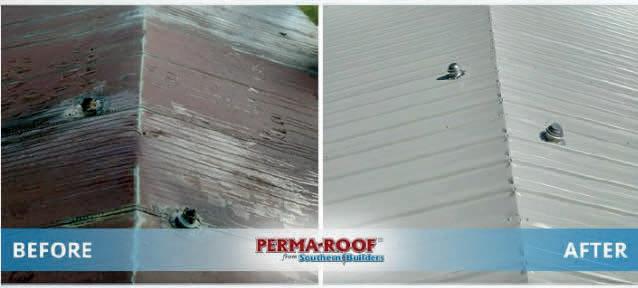


Crafters, artists, and makers selling boutique and seasonal items, baked goods and preserves, apparel, home decor, and more! For questions, email Jackie Mason at boss108ventures@gmail.com.
NOV. 1 – Delphos Kiwanis Pancake and Sausage Day, 901 Wildcat Lane, Delphos, 7 a.m.– 1:30 p.m. $9 pre-sale; $10 at door; 10 and under dine inside for free. See any Kiwanis member for tickets or stop in Westrich Furniture for tickets. www.facebook.com/ kiwanisclubofdelphos.
NOV. 2 – Puck-I-Huddle Fall Craft Show, St. Marys Memorial High School Gym, 2250 St. Rte. 66, St. Marys, 12–4 p.m. Entry fee: donation to GoodFellows Charity in St. Marys. Local handmade and homemade goods. Over 70 vendors. 419-300-4611 or info@stmarysohio.org.
NOV. 8 – 17th Homemade Craft Sale and Lunch, Shiloh Church, 2100 Co. Rd. 5, Delta, 9 a.m.–4 p.m. Baked goods, peanut brittle, custom jewelry, purses, holiday and Christmas décor, crocheted/knit/sewn items, tole painting, and much more! Homemade lunch 11 a.m.–2 p.m. (or till gone). Benefits Sparrow’s Nest Women’s Shelter. 419-533-2083
NOV. 8 – Lima Symphony: “Vivaldi’s Four Seasons,” Veterans Memorial Civic and Convention Center, #7 Town Square, Lima, 7:30 p.m. Featuring violinist Geneva Lewis. Opens with Nokuthula Ngwenyama’s Primal Message, followed by Vivaldi’s Four Seasons, and concluding with Mozart’s 40th Symphony. 419-222-5701 or www.limasymphony.com.
NOV. 13 – Colin Mochrie and Brad Sherwood: “Asking for Trouble,” Lima Civic Cent Veterans Memorial Civic and Convention Center, #7 Town Square, Lima, 7:30 p.m. The dynamic duo from Whose Line Is It Anyway? takes the stage for a night of improv comedy. 419-2225701 or www.limasymphony.com.

OCT. 11 – “Taste of Harrison,” Jackson Square, Clarksburg, 3–6 p.m. Car show 3–7 p.m. happening@


firstfridaysclarksburg.com or www.facebook.com/ ClarksburgHistoryMuseum.
OCT. 18 – Fall Fort Day, Fort New Salem, 81 Settlers Lane, Salem, 10 a.m.–4 p.m. $8; under 10 free with paying adult. Kids’ and family activities, costumed interpreters, cabin tours. Food and beverages for purchase. 304-695-2220, director@fortnewsalemfoundation.org, or www. fortnewsalemfoundation.org.
NOV. 7 – First Fridays: “Celebrating Veterans,” Christ Episcopal Church, Clarksburg, 4:30–8 p.m. happening@ firstfridaysclarksburg.com or www.facebook.com/ ClarksburgHistoryMuseum.

OCT. 11–12, 18–19 – Old-Fashioned Christmas in the Woods, 44337 County Line Rd., Columbiana, 9 a.m.–5 p.m. $10 (cash only); 12 and under free. In a wooded setting, costumed crafters will demonstrate their crafts and sell a wide selection of handmade holiday items, as well as traditional crafts. We recommend bringing cash when possible. https:// christmasohio.com.
THROUGH OCT. 11 – “Quilts Galore!” Exhibit, McCook House Museum, 15 Public Square, Carrollton, Fri./Sat. 10 a.m.–5 p.m. Adults $5, children $3. Come see the plethora of talent our rural Carroll County has to offer. Enjoy the stories that accompany each hand-sewn and machine-made entry. 330-437-9715 or kathorn4120@gmail.com.
THROUGH OCT. 31 – Corn Maze, Beriswill Farms, 2200 Station Rd., Valley City, Tue.–Fri. 10 a.m.–5 p.m., Sat.–Sun. 10 a.m.–6 p.m. Open till 9 p.m. Oct. 4 and 18. Test your sense of direction in this 5-acre maze. 330-350-2486 or http://beriswillfarms.com.
THROUGH OCT. 31 – “Trails of Immersion” Art Exhibition, Cleveland Botanical Garden/Holden Forests and Gardens, 11030 East Blvd., Cleveland. Featuring landscape artist Jennifer Sowders. Enjoy this exhibition as part of your day at the gardens, where admission is $20 for nonmembers, free for members. https://holdenfg.org/attractions/clevelandbotanical-garden/art-galleries.
THROUGH OCT. 26 – Glassburn’s Fun Farm, 283 Church St., Bidwell. $8/person. Corn maze, corn pit, 4 culvert slides, pedal car track, pumpkin patch, duck racing, culvert rollers, and more. 740-645-6531 or check us out on Facebook @ Glassburn’s Fun Farm for hours and days open.
THROUGH NOV. 27 – Athens Farmers Market, Athens Community Center, 701 E. State St., Athens, Wed. 9 a.m.–noon. Open year-round Sat. 9 a.m.–noon. 740-593-6763, www.athensfarmersmarket.org, or www.facebook.com/afm.ohio.
OCT. 10–11, 17–18, 24–25, 31, NOV. 1 – Ghost Tours of Zoar, Historic Zoar Village, 198 Main St., Zoar, 6:30–8:30 p.m. $19. Learn about supernatural encounters shared by staff, visitors, and residents of Zoar on a walking tour of the village. Recommended for adults and children over the age of 12. Reservations required. 330-874-3011 or www. historiczoarvillage.com.
OCT. 18 – Hartville Coin Show, Hartville MarketPlace and Flea Market, 1289 Edison St. NW, Hartville, 9 a.m.–3 p.m. Over 30 vendors of vintage and new coins, precious metals, and paper currency, plus food and indoor shops. 330-877-9860 or www. hartvillemarketplace.com/events.
OCT. 25 – The Cleveland Celtic Ensemble: “Ethereal Sounds,” Cloverleaf Center for the Performing Arts, 7540 Buffham Rd., Seville, 7:30 p.m. $15 in advance; $20 at door. The ensemble blends Scottish and Irish bagpipes, whistle, flute, fiddle, harp, and dance to create a Celtic style all their own. www. ormaco.org.
OCT. 26 – Model Railroad and Toy Show, 735 Lafayette Rd. (St. Rte. 42), Medina, 9 a.m.–3 p.m. $8 Get a jump on your Christmas shopping. 330-9484400 or www.conraddowdell.com.
OCT. 31, NOV. 1 – Earlier Times Antiques and Folk Art Show: “Remembering Christmas Past,” Harvest Ridge, Holmes Co. Fgds., 8880 St. Rte. 39, Millersburg, Fri. 4–7 p.m., Sat. 10:30 a.m.–2:30 p.m. For information, please contact Cheryl Williams at 614-989-5811
NOV. 7–8 – Gingerbread House Arts and Crafts Show, Mentor United Methodist Church, 8600 Mentor Ave., Mentor, Fri. 4–8 p.m., Sat. 10 a.m.–-3 p.m. Free. Over 75 local crafters, Attic Treasures, Bake Shoppe, Middlefield cheese, and more. http:// gingerbreadcraftshow.wixsite.com/home.
NOV. 8–9 – Medina Gun Show, Medina Co. Fgds. Community Center, 735 Lafayette Rd. (St. Rte. 42), Medina, Sat. 9 a.m.–5 p.m., Sun. 9 a.m.–3 p.m. $8 450 tables of displays. 330-948-4400 or www. conraddowdell.com.
NOV. 9 – “Jigs, Gigs, Gigues, and Giggles: Violin Fun with Dance Music,” Wadsworth Public Library, 132 Broad St., Wadsworth, 2–3 p.m. Free. A lighthearted and informative concert of solo violin music performed by Amy Glick, violinist with the Akron Symphony Orchestra and violin professor at Kent State University. Seating on a first-come, first-served basis. 419-853-6016 or www.ormaco.org.
NOV. 12 – An Evening of Wine, Celebration, and Music: 15th Anniversary Annual Dinner, Blue Heron Ballroom, 3227 Blue Heron Trace, Medina, 6 p.m. $65/person with cash bar. Mix and mingle with old friends and new while you enjoy a splendid dinner buffet. Singer-songwriter Jerry Popiel will perform. Final reservations due before Oct. 24 419-853-6016 or www.ormaco.org.
OCT. 2–31 – The Mothman Experience at Haunted Mountain, Sugarloaf Mountain Amphitheater, 5968 Marietta Rd., Chillicothe, 5:30–11 p.m. $30–$50 Thrilling fall fun with the original show It Flies by Night, a haunted trail, an escape room, a scavenger hunt, tomahawk throwing, and more! www. hauntedmountain.org.
OCT. 10–12 – Chillicothe Halloween Festival, Yoctangee Park, 1 Enderlin Circle, Chillicothe, Fri./ Sat. 10 a.m.–10 p.m., Sun. 10 a.m.–5 p.m. Free. A spooktacular mix of family fun, with inflatables, escape rooms, live entertainment, a haunted attraction, costume contests, trunk-or-treat, and coffin races! www.chillicothehalloweenfestival.com.
OCT. 17–19 – Fall Festival of Leaves, downtown Bainbridge, Fri./Sat. 10 a.m.–10 p.m., Sun. 10 a.m.–6 p.m. Free. Parades, crafts, live entertainment, car and tractor shows, contests, a 5K run, and scenic Skyline Drives. www.fallfestivalofleaves.com.
OCT. 18 – Rule the Roost, Earl H. Barnhart Buzzard’s Roost Nature Preserve, 514 Red Bird Lane, Chillicothe, 8 a.m. $20–$109. The thrilling final race of the Runfluent Ohio Trail series, featuring a scenic figure-8 trail course with 7K, 12-hour solo, and 2-person relay options. Perfect for runners and spectators alike! www.dontjustrun.com.
OCT. 25 – Trick or Treat on Main, Cambridge, 11 a.m.–1 p.m. Free. www.downtowncambridge.com.
NOV. 1–DEC. 31 – Dickens Victorian Village, downtown Cambridge. Stroll the downtown streets to view more than 100 lifelike scenes that capture the spirit of Victorian England. 800-933-5480 or www. dickensvictorianvillage.com.
NOV. 1–JAN. 1 – Guernsey County Courthouse Holiday Light Show, Cambridge. Synchronized light and music shows nightly. More than 85,000 lights, two amazing 23-foot Christmas trees, and 60 animated displays. 800-933-5480 or www. dickensvictorianvillage.com.
NOV. 7 – Recycle the Cheer, Marietta Main Street, 241 Front St., Marietta, 5–7 p.m. We’re teaming up with the Salvation Army of Washington County to collect donations of new and used holiday decorations to redistribute to area families. Help us spread the cheer! Bring your donations to the Armory lawn. www.mariettamainstreet.org/events.
NOV. 8 – Fleetwood Gold, Majestic Theatre, 45 E. Second St., Chillicothe, 7:30 p.m. $28–$40. The Midwest’s most-followed Fleetwood Mac tribute band delivers an authentic, high-energy performance spanning the group’s greatest hits and Stevie Nicks’ solo career—no backing tracks, just pure live music. www.majesticchillicothe.net.
THROUGH OCT. 25 – Coshocton Farmers Market, Skip’s Landing, 22375 Co. Rd. 1A, Coshocton, Sat. 8:30 a.m.–noon. Locally grown produce, baked goods, and artisan crafts. Rain or shine. www. facebook.com/coshoctonfarmersmarket or email market.manager@coshfarmmarket.org.
THROUGH OCT. 31 – Corn Maze and Fall Fun Farm, McDonald’s Greenhouse and Corn Maze, 3220 Adamsville Rd., Zanesville, Mon.–Fri. 9:30 a.m.–6 p.m., Sat. 10 a.m.–6 p.m., Sun. 12–6 p.m. $10. Hay wagon rides, corn maze, kids’ activities, live animals, and of course some apple cider and pumpkin donuts! 740-452-4858 or www.mcdonaldsgreenhouse.com.
THROUGH NOV. 6 – Exhibitions at the MAC, Peggy R. McConnell Arts Center, 777 Evening St., Worthington. Free. Three exhibitions on display: Quantifying Care by Lily Glass, Intertwined by Margarita Vilshanetskaya, and Power of Growth by Weiting Wei. The public is also invited to artist-guided gallery tours on Oct. 2, 16, and 30, 7–8 p.m. www. mcconnellarts.org.
OCT. 3 – Matisse: From MOMA and Tate Modern, Peggy R. McConnell Arts Center, 777
THROUGH OCT. 27 – Rib City BBQ & Bluegrass, 746 NW Washington Blvd., Hamilton, Mon. 7–9 p.m. Free admission. Enjoy an evening of lively bluegrass music by Vernon McIntyre’s Appalachian Grass. Call 513-829-7427 before traveling.
THROUGH NOV. 26 – Bluegrass Wednesdays, Vinoklet Winery, 11069 Colerain Ave., Cincinnati, Wed. 6:30–8:30 p.m. Enjoy dinner, wine, and an evening of free entertainment by Vernon McIntyre’s Appalachian Grass. Reservations recommended. 513-385-9309, vinokletwinery@fuse.net, or www.vinokletwines.com.
THROUGH NOV. 30 – Pumpkin Blow, Neusole Glassworks, 11925 Kemper Springs Dr., Cincinnati,
Evening St., Worthington. Part of the Exhibition on Screen documentary series, which works with top international museums and galleries to create films that offer a cinematic immersion into the world’s bestloved art. www.mcconnellarts.org.
OCT. 15–19 – Circleville Pumpkin Show, downtown Circleville. Free admission. Giant Pumpkin Weigh-In, pumpkin products of all kinds, rides, live entertainment, craft and food vendors, the Giant Pumpkin Pie, and much more! Two parades daily Wed.–Fri., 3:30 and 8 p.m.; Sat. parade 8 p.m. only. www.pumpkinshow.com.
OCT. 17–19 – Apple Butter Stirrin’ Festival, Historic Roscoe Village, 600 N. Whitewoman St., Coshocton, Fri./Sat. 10 a.m.–6 p.m., Sun. 10 a.m.–5 p.m. $5–$8; 12 and under free. Homemade apple butter cooked over an open fire, live music, free crafts for kids, 100+ craft and food vendors, canal boat rides, lantern tours, and more! 740-623-6567 or www.roscoevillage.com.
OCT. 18–19 – “Education of Yesterday” Annual Farm Show, 3685 Cass Irish Ridge Rd., Dresden ((intersections of St. Rtes.16 and 60), Sat. 9 a.m.–5 p.m., Sun. 10 a.m.–4 p.m. Antique tractors, trucks, construction equipment, and more. Train rides, daily field demos, kids’ events, food trucks, and music. 740-754-6248 or www.facebook.com/ educationofyesterday.
NOV. 1 – “Native Garden in Autumn: Fall Planting and Seed Saving,” Park HQ, 16405 U.S. 23, South Bloomfield. 10 a.m. Learn the benefits of planting in autumn, techniques for collecting and saving seeds, and tips to support biodiversity year-round. Free seed collection in the garden! To register or for questions, email mellis@pickawaycountyohio.gov or visit www. pickawaycountyparks.org.
Wed./Thur. 10 a.m.–6 p.m., Fri.–Sun. 10 a.m.–8 p.m. (excluding Thanksgiving Day). $55 per 30-minute session. Must be 5 years and older. Make your own blown-glass pumpkin from hot molten glass! Reservations required. 513-751-3292 or neusoleglassworks@hotmail.com.
OCT. 10–12 – Wheat Ridge Olde Thyme Herb Fair and Farm Festival, Grindstone Farm, 817 Tater Ridge Rd., West Union, 10 a.m.–5 p.m. Free admission; $5 parking. 140 artisans and craftspeople, herbal products, from-scratch food, live music, antiques, pumpkins, gourds and mums, antique tractor show, and shooting the pumpkin cannon. 937-5448252 (Kim Erwin).
OCT. 18 – Hay Wagon Ride, Wagers’ Memorial Park (Devils Backbone), 1301 OH-725 W., Camden, 11 a.m.–3 p.m. Free. Ride the hay wagon to and from the Black Walnut Festival. 937-962-5561, pcpdevents@ gmail.com, or www.preblecountyparks.org.
OCT. 18–19 – Black Walnut Festival, downtown Camden, 9 a.m.–5 p.m. 120+ craft vendors! Handmade and artisan crafts, fall produce, antiques and collectibles, parade, car and truck show, Kid Zone, 25 food trucks, and more. Oh, and let’s not forget the great hand-cranked, homemade ice cream! www.camdencomeback.org/black-walnut-festival.
NOV. 7 – First Friday Art Walk, downtown Zanesville, 5–8 p.m. Come downtown on the first Friday of each month, when all our participating galleries, studios, and small businesses are open at the same time! See our website for a map of current participants: https:// artcoz.org/arts-district-map.
NOV. 7 – Leonardo: The Works, Peggy R. McConnell Arts Center, 777 Evening St., Worthington. Part of the Exhibition on Screen documentary series, which works with top international museums and galleries to create films that offer a cinematic immersion into the world’s best-loved art. www.mcconnellarts.org.
NOV. 8 – Veterans March and Ceremony, Canal Winchester, 10 a.m. March begins at Frances Steube Community Center, 22 S. Trine St., and ends at Stradley Place, 36 S. High St., for the ceremony. Free pancake breakfast for veterans and their families 8:30–10 a.m. at the Community Center. 614-8349915 or www.canalwinchesterohio.gov.
NOV. 13 – Pickerington Lions Club Pizza Challenge, Combustion Brewery and Taproom, 80 W. Church St., Pickerington. VIP early entry 5:30–6 p.m., all others 6–8 p.m. $5–$15. Taste pizza from several different places around town and vote on your favorite. Proceeds will be donated to local veterans organizations. https://e-clubhouse.org/sites/ pickeringtonoh or picklionspizza@gmail.com.
NOV. 15 – “Tinctures and Glycerites: Crafting Herbal Extracts,” Park District HQ, 16405 U.S. 23 S., Bloomfield, 1–2:30 p.m. $35. Join us for a hands-on folk herbalism workshop designed to empower you to build your own modern home apothecary. Register on Eventbrite. For questions, email mellis@pickawaycountyohio.gov or visit www. pickawaycountyparks.org.
NOV. 1–DEC. 28 – Ornament Blow, Neusole Glassworks, 11925 Kemper Springs Dr., Cincinnati, Wed./Thur. 10 a.m.–6 p.m., Fri.–Sun. 10 a.m.–8 p.m. (excluding Thanksgiving Day, Christmas Eve, Christmas Day). $45 per person. Must be 5 years and older. Make your own holiday ornament from hot molten glass! Reservations required. 513-751-3292 or neusoleglassworks@hotmail.com.
NOV. 8 – Holiday Affair, Tipp Center, 855 N. 3rd St., Tipp City, 10 a.m.–4 p.m. Free admission and door prizes! Wide variety of handcrafted holiday and gift-giving items created by local artists. 50+ vendors on-site. This event is part of Tipp City’s annual Yuletide Winter’s Gathering. 937-543-5115, www. tippcityartscouncil.com/a-holiday-affair, or www. facebook.com/TippCityAreaArtsCouncil.
NOV. 11 – Holiday Horse Parade, downtown Piqua. Free. Begins at 6:30 p.m. with the Holiday Illumination, highlighting beautiful new tree lights on the square. Parade follows at 7 p.m. with carriages, hitches, and riders outfitted with holiday lights, making their way through downtown. 937-773-9355 or www.mainstreetpiqua.com.


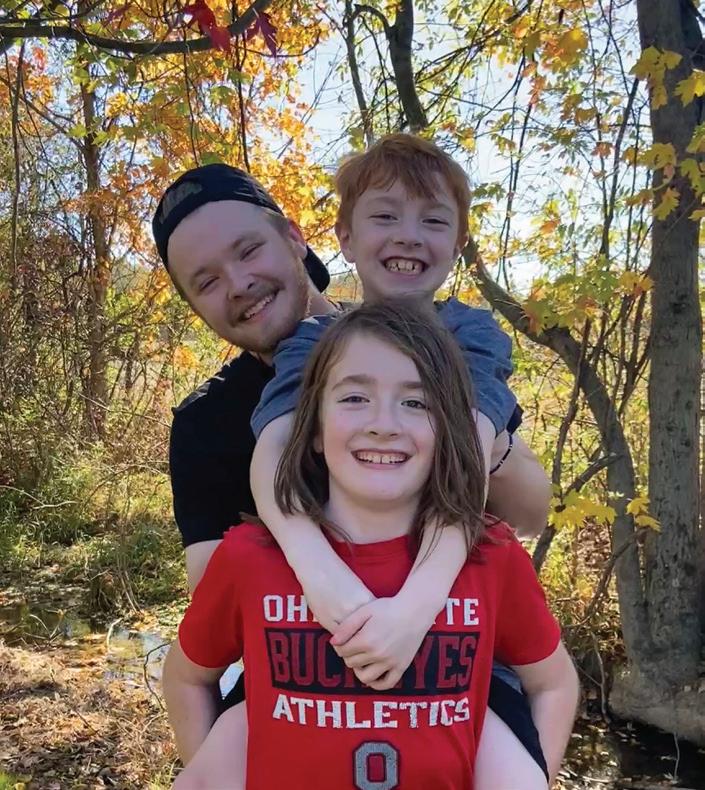



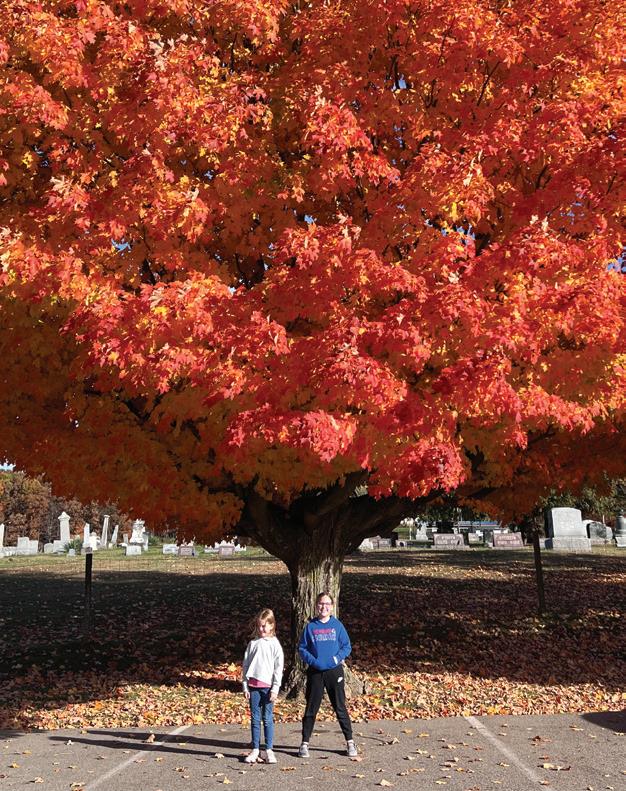

1 Sugar maple sunrise at Slate Run Living Historical Farm. Allison Shaw, South Central Power Company member
2 Georgia and Colton enjoying their grandparents’ giant leaf pile. Jill Persinger, North Central Electric Cooperative member.
3 We do a photo shoot every fall with my grandsons, Benjamin Brubaker and Gabe and Eli Garlinger. Teresa Garlinger, Consolidated Cooperative member.
4 A beautiful fall day at the lake. Amy Hacker, Washington Electric Cooperative member.
5 My daughters, Adilee and Maggie, with the beautiful maple tree by the Nashville Elementary parking lot. Jessica Kurtz, Holmes-Wayne Electric Cooperative member.
6 Pond in my front yard. Beautiful reflection of the fall colors. Sheri Divelbiss, Consolidated Cooperative member
7 Our granddaughter, Aleena, having fun in the fall leaves. Gina Lewis, Mid-Ohio Energy Cooperative member.



Send us YOUR picture! For January, send “Bedtime routine” by October 15; for February, send “Will you marry me?” by November 15. Upload your photos at www.ohioec.org/memberinteractive, and remember to include your co-op name and to identify everyone in your photos.
Nov. 4, 2025 • Polls open 6:30 a.m.–7:30 p.m.
(Deadline to register is Oct. 6, 2025)
